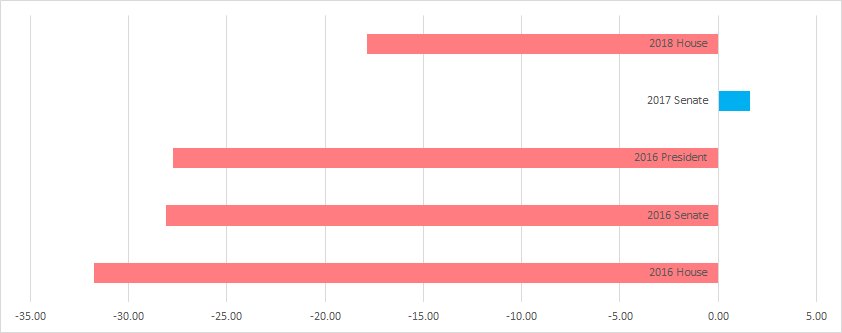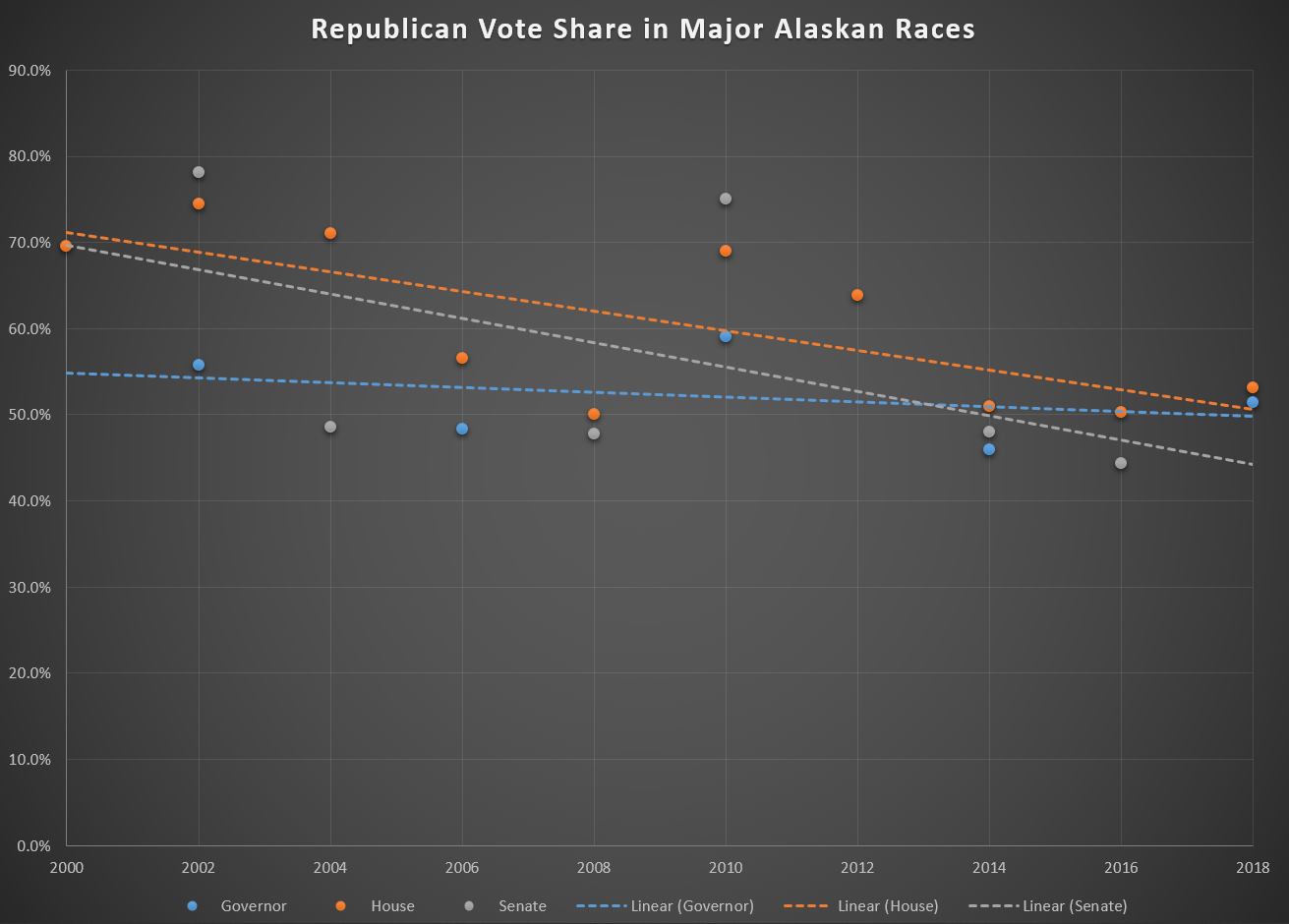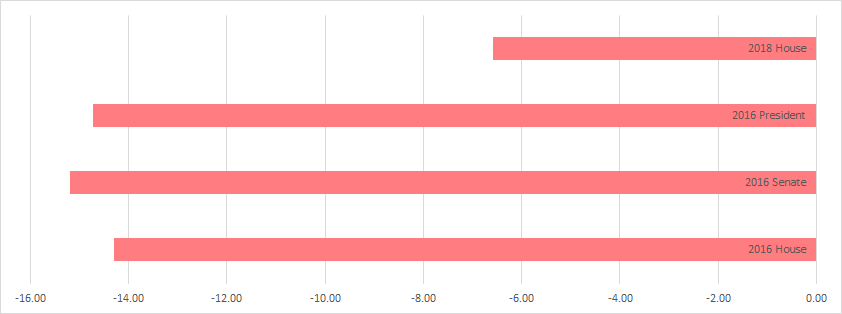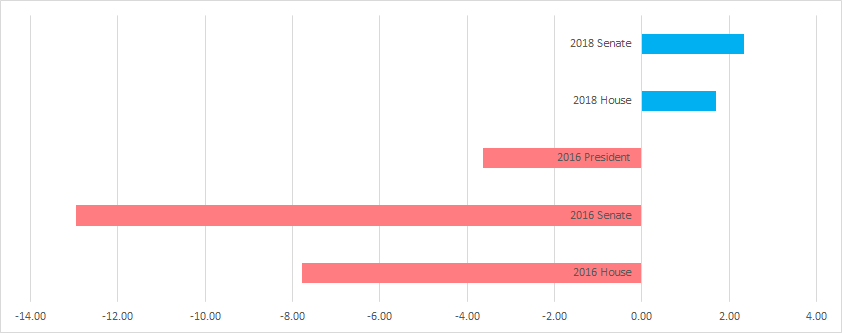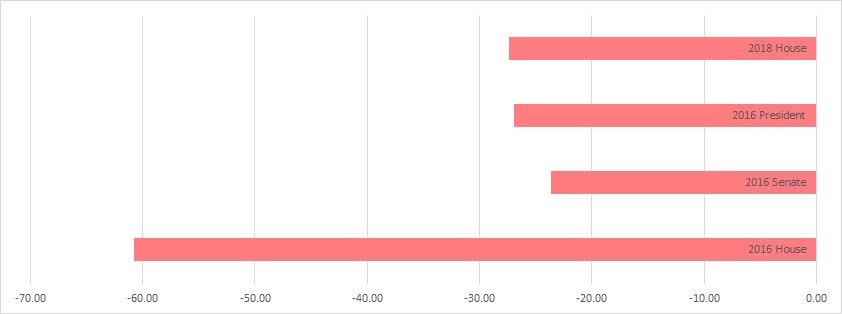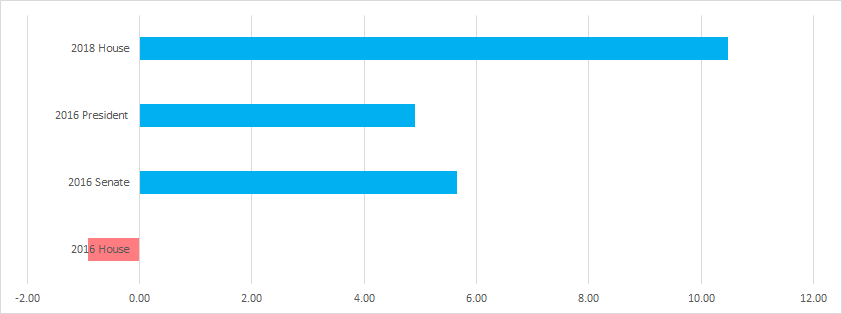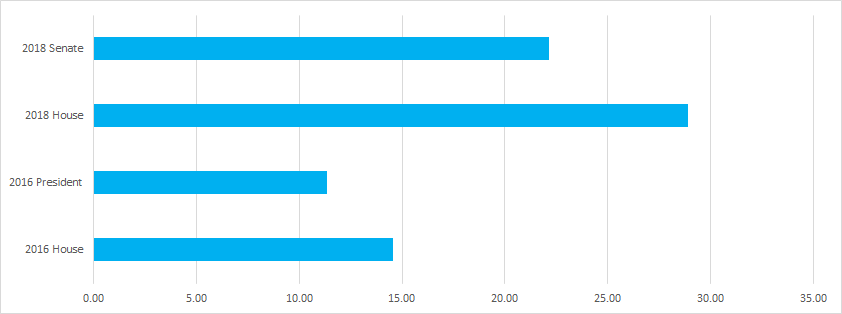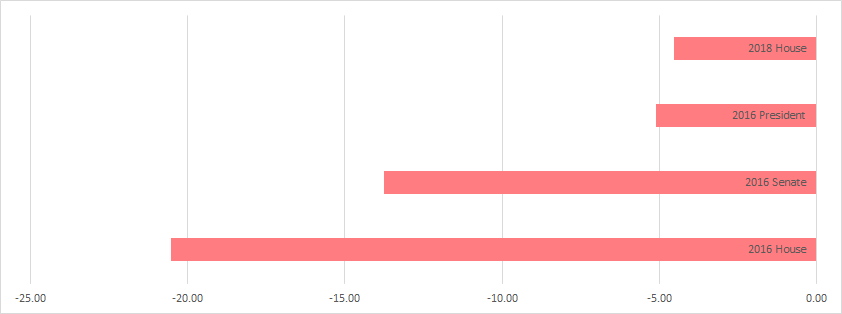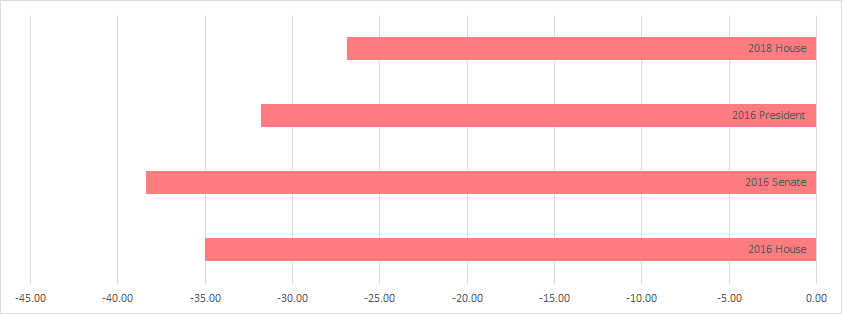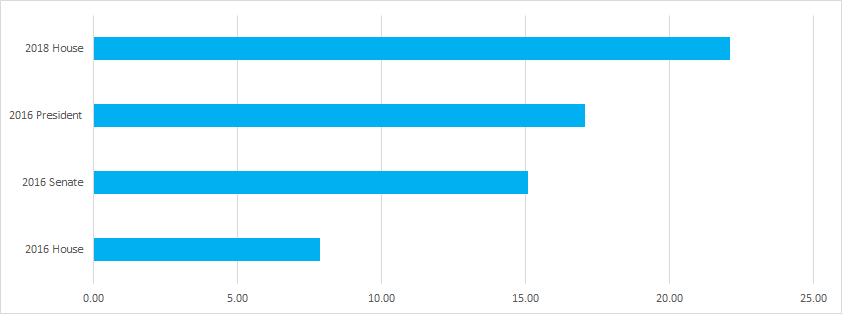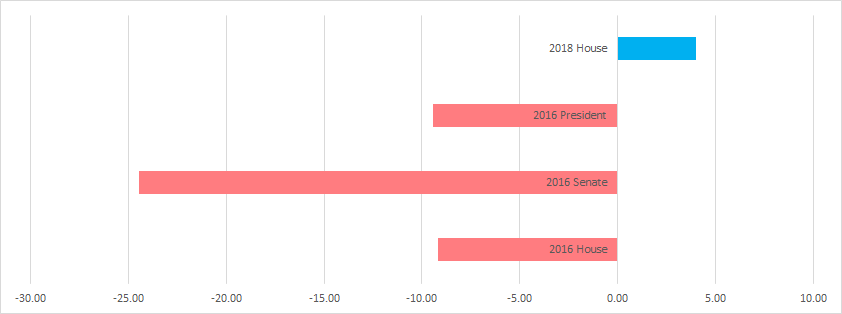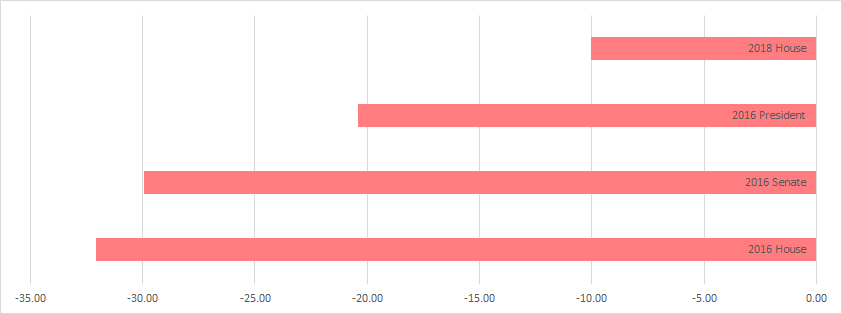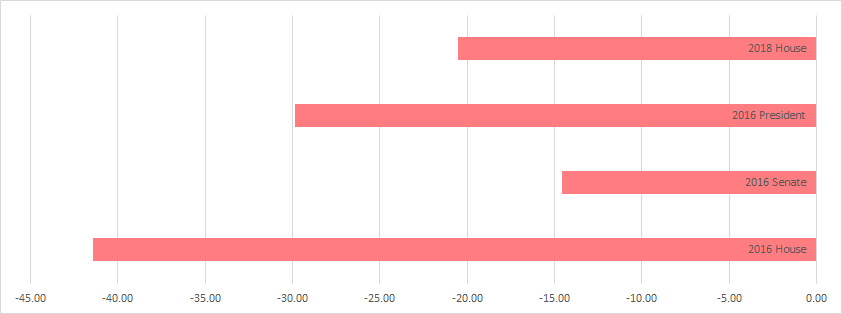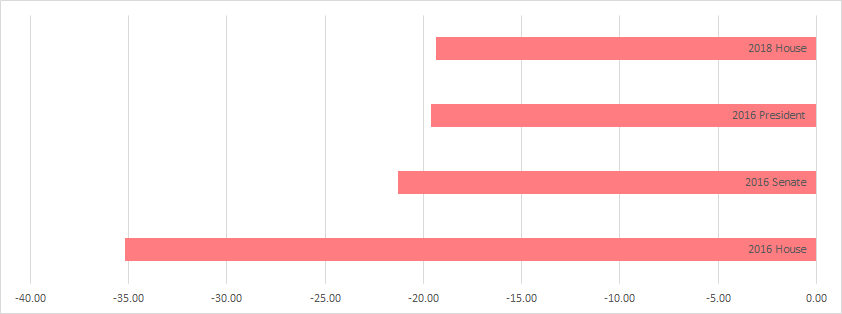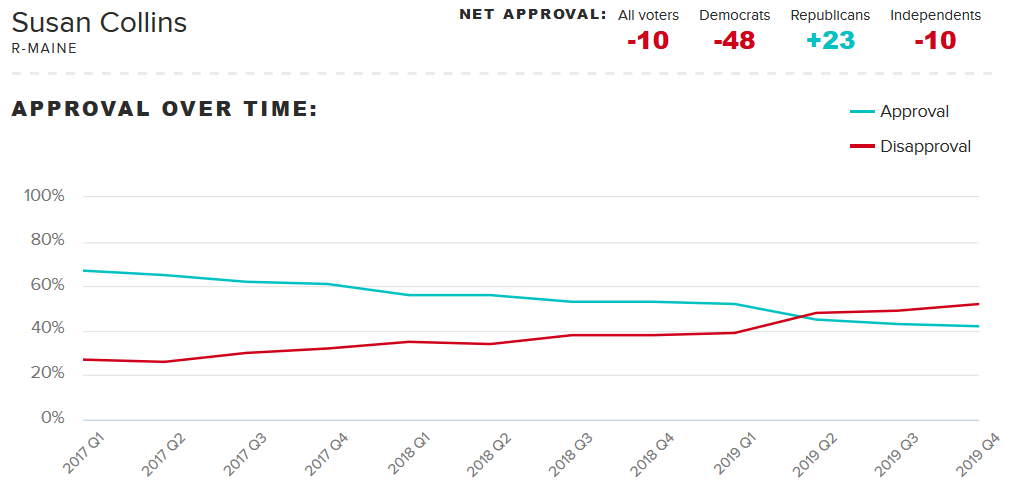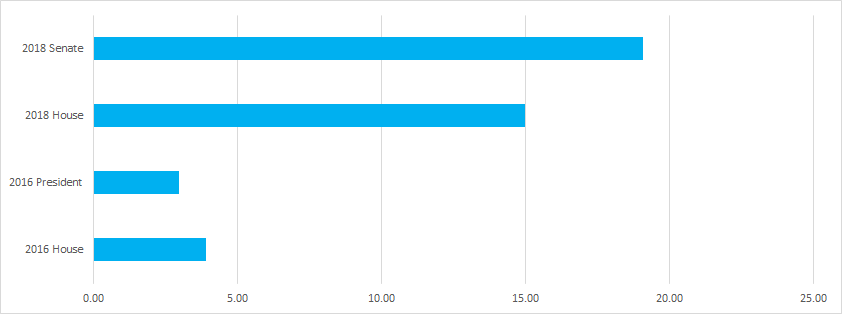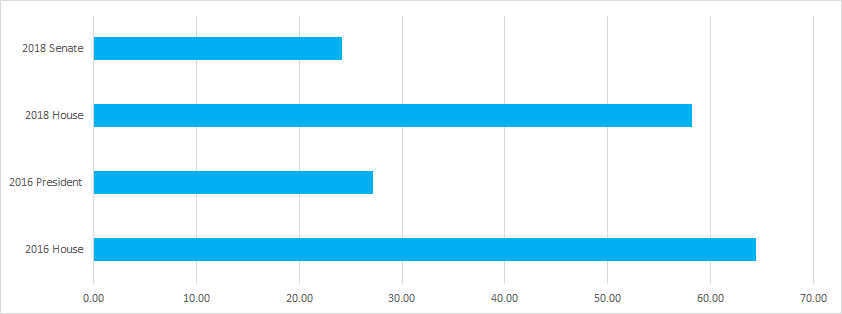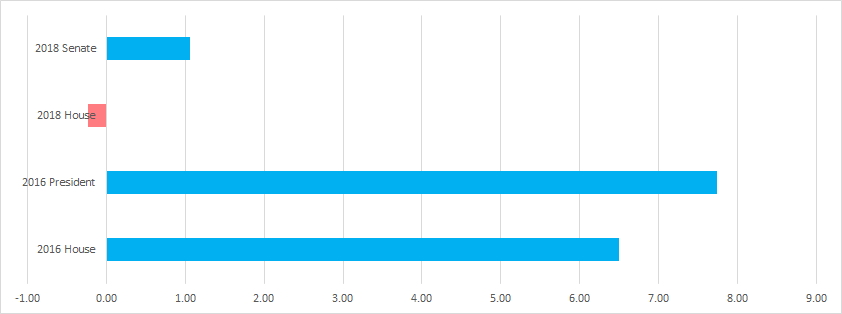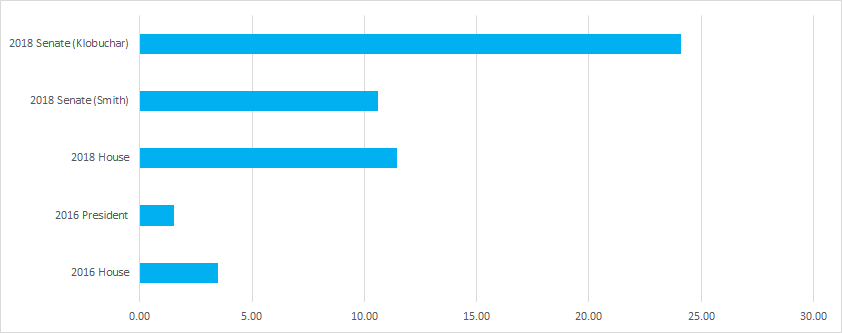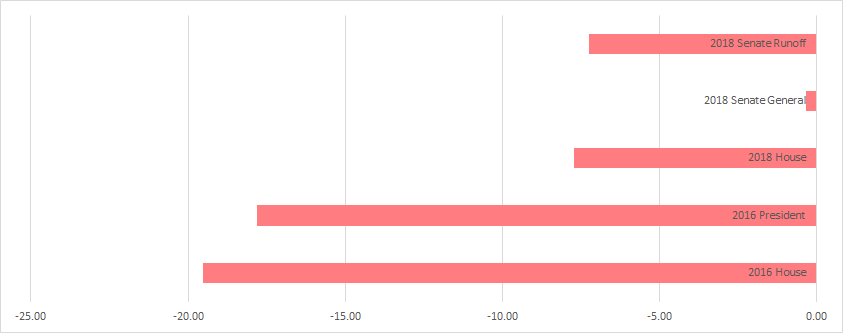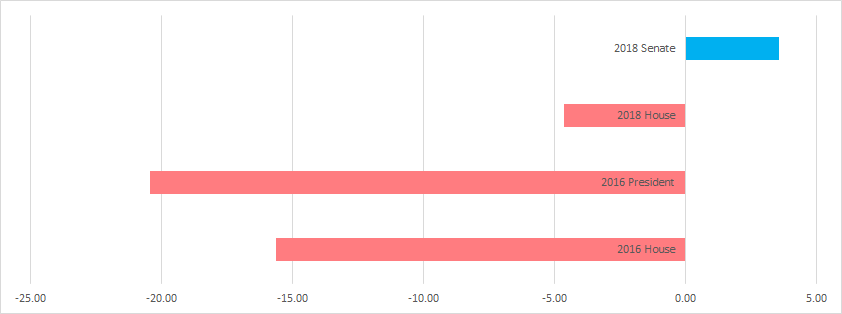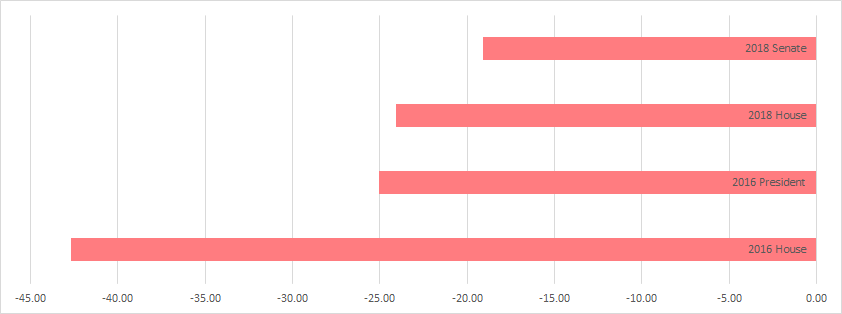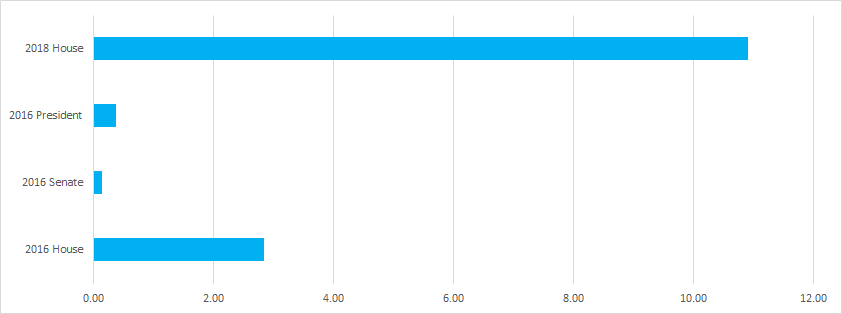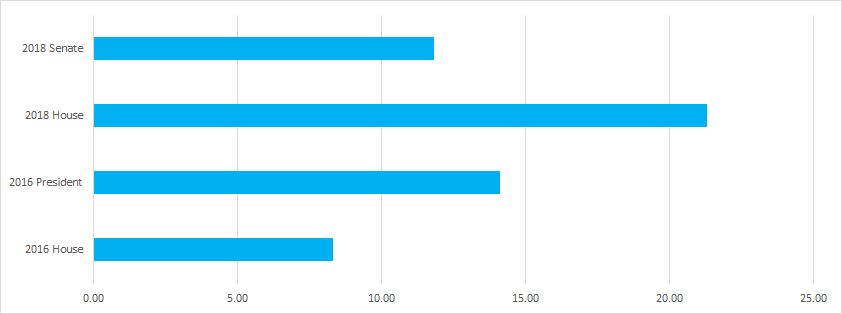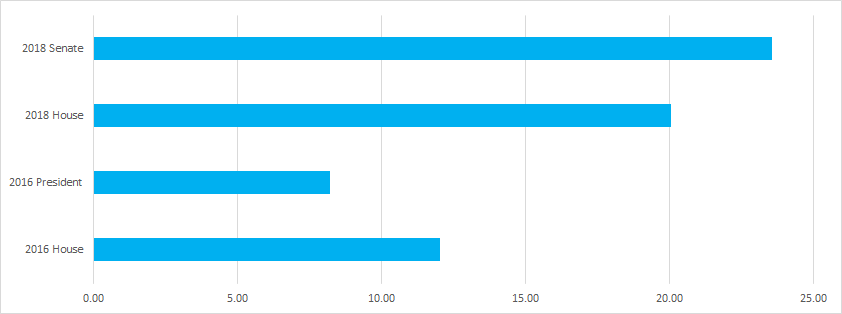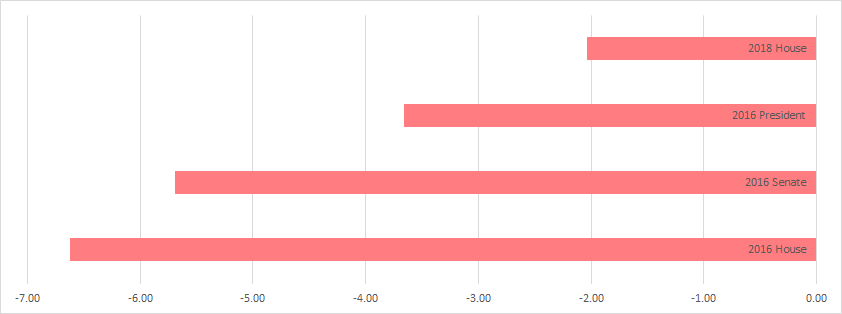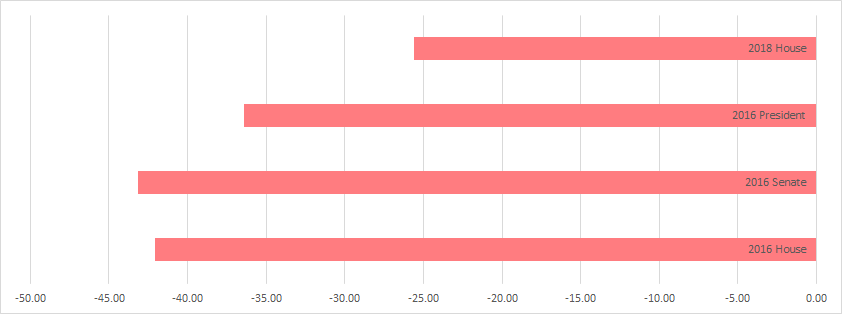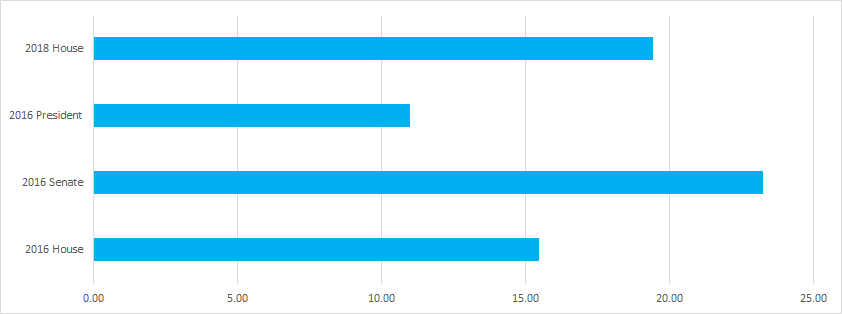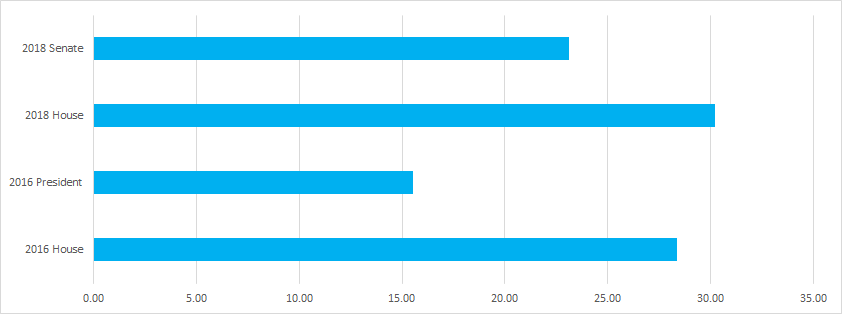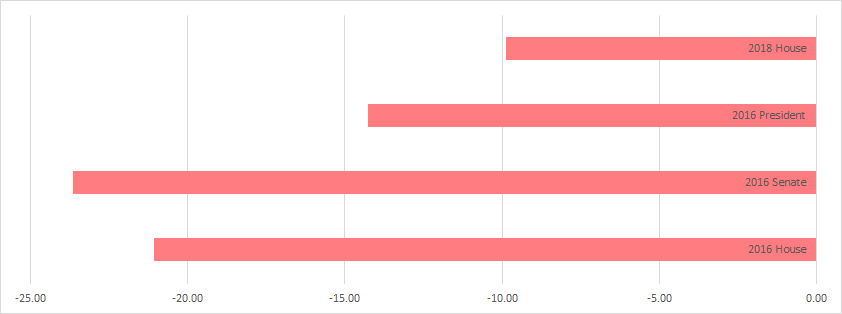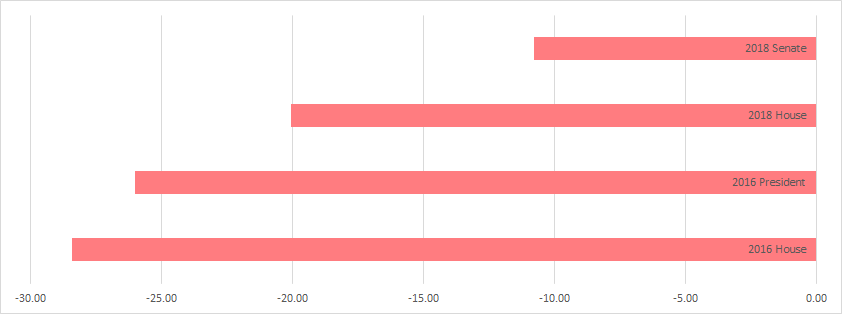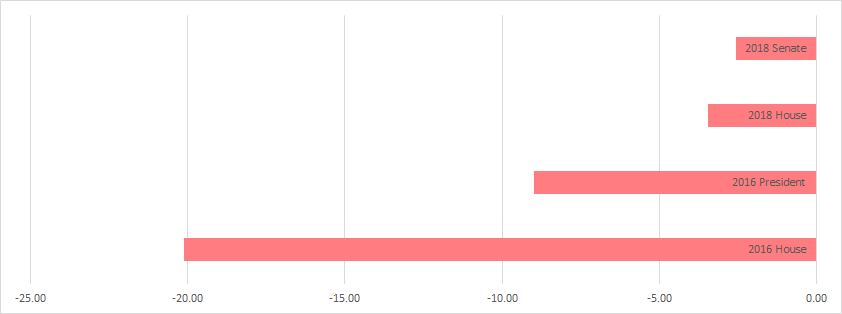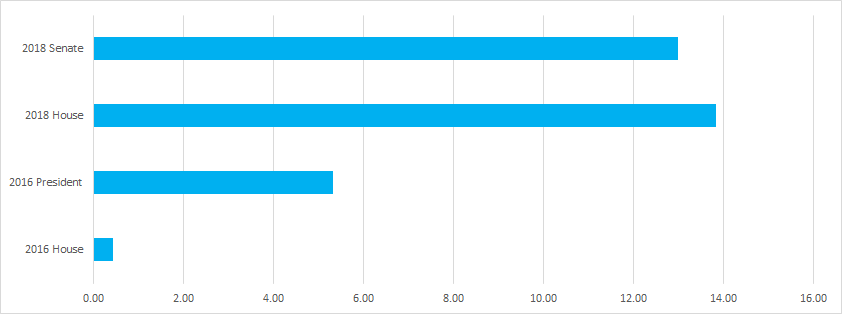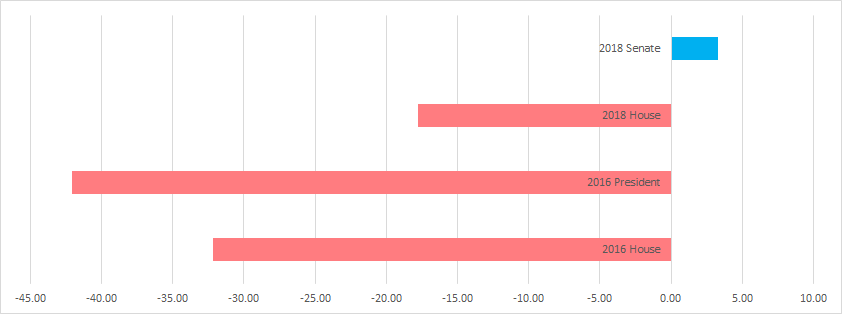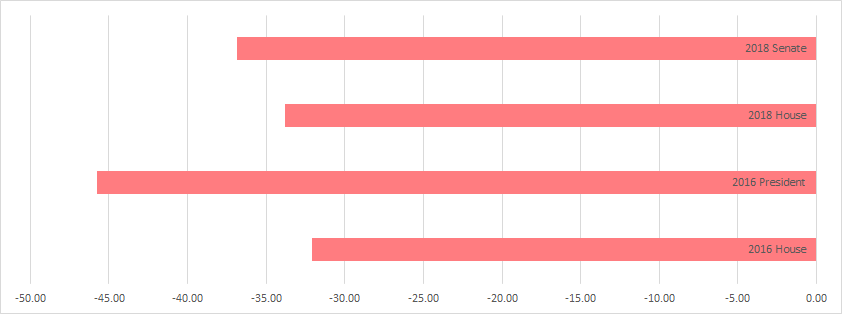Updated August 11, 2020: Slowly getting caught up on polling, fundraising, and primaries from the last couple months.
Previously Updated June 9, 2020: Updated Georgia and West Virginia writeups to reflect results of June 9th primaries
On November 3, 2020, much more will be decided than whether Donald Trump secures a second term as president. Control of the Senate will also be at stake, with 35 seats up for grabs. This article attempts to identify which Senate seats are flippable, and which are not (regardless of how many tens of millions of dollars are thrown at them).
To identify which is which, I will use Senate polling, historical voting behaviors—and until more data becomes available—a measure of Senate-voting bias I am experimenting with, Senate Election Deviation (SED).
The first version of this article was published in July 2019, and was 5,981 words long. But upon publishing it I immediately set out on a complete rewrite and expansion of my original effort. This edition of the article measures 11,464 words in length. And it won’t stop there. This is intended to be a resource that will be useful right up until election day. I will be periodically updating it as candidates are nominated, incumbents drop out, and new polling and analyses becomes available.
Before delving into this article, I would recommend reading these two write-ups, which give a bit of background context on my motive for doing this, and the math behind SED:
- PVI, the Generic Ballot, and the Importance of Prioritizing Winnable Elections
- How My Half-Baked 2020 Senate Election Deviation (SED) Analysis Works
For your convenience, the names of the 34 states holding Senate elections in 2020 are listed below and link to their corresponding analyses.
Alabama
- Incumbent: Doug Jones (D) – Won 2017 by 1.7% – $8.78 M cash on hand June 2020
- Challenger: Tommy Tuberville (R) – $0.55 M cash on hand June 2020
- My Rating: R+17.2 (Flip D -> R)
In Alabama, incumbent—and proof that unicorns are real—Doug Jones is fighting to hold the seat he won after Republicans managed to nominate noted creepster Roy Moore to fill Jeff Sessions’ vacated seat in 2017. He’s facing off against Tommy Tuberville, a former college football coach. Tuberville secured the nomination by beating out Jeff Sessions, the former occupant of the seat (before he made the ill-advised decision to resign and accept Donald Trump’s invitation to be Attorney General).
Election prognosticators had considered this election to either be a tossup or lean-R, but are slowly recognizing that Alabama does Alabama things. To his benefit, Doug Jones does have a narrow positive approval rating. And, I think the rating I calculated last year vastly overestimates Tuberville’s advantage, as Jones is a stronger Democratic candidate than the state has seen in many years.
But I think he’s still turbo-boned. Reasons why:
- It’s Alabama.
- It’s Alabama.
- Roll Tide.
Unless something absolutely crazy happens, I think this race will be called within a couple hours of polls closing on election night.
Polling:
| Pollster | Date Completed | Jones (D) | Tuberville (R) |
|---|---|---|---|
| June-Aug Polling Avg | 37.8% | 48.3% | |
| Morning Consult | 2020/08/02 | 35% | 52% |
| Auburn University | 2020/07/09 | 36% | 44% |
| ALG Research (Internal) | 2020/06/22 | 44% | 47% |
| Cygnal | 2020/06/16 | 36% | 50% |
| FM3 Research (Internal) | 2020/05/18 | 44% | 47% |
| Mason-Dixon | 2020/02/06 | 42% | 50% |
| JMC Analytics | 2019/12/18 | 40% | 47% |
Previous Elections:
- 2018 House: R – 58.78% / D – 40.89% / Margin – R+17.89%
- 2017 Senate: Jones (D) – 49.97% / Moore (R) – 48.34% / Margin – D+1.63%
- 2016 President: Trump (R) – 62.08% / Clinton (D) – 34.36% / Margin – R+27.72%
- 2016 Senate: Shelby (R) – 63.96% / Crumpton (D) – 35.87% / Margin – R+28.09%
- 2016 House: R – 64.67% / D – 32.91% / Margin – R+31.76
Alaska
- Incumbent: Dan Sullivan (R) – Won 2014 by 2.2% – $5.36 M cash on hand June 2020
- Challenger: Al Gross (I) – $3.21 M cash on hand June 2020
- Challenger: No (D) Candidate – Al Gross endorsed by DSCC
- My Rating: D+7.9 (Flip R -> D) (See below)
Yes, I know I know you’re looking at that D+7.9 and wondering what I’m smoking. Bear with me for a minute.
Alaska is a really difficult Senate seat to analyze, in large part because of how messy the 2010 and 2016 Senate races in that state were. But the 2008 and 2014 Senate races (both for the very seat being fought over in 2020) are pretty clean and easy to analyze.
In 2008, Democrat Mark Begich defeated 6-term incumbent Ted “Series of Tubes” Stevens. Stevens had a minor problem. A week before the election, he was convicted of 7 felony counts of corruption, relating to having failed to report political gifts. Had he won, he would have been the first felon ever elected to the Senate. To state the obvious, his legal troubles likely contributed to his loss. In the previous Senate election in 2002, Stevens won by more than 67 points (yes, seriously). Winning by a very large margin and then losing the subsequent election is profoundly rare (as I discuss in greater detail in my breakdown of the Maine Senate election).
But it may well be that even had Stevens not run into legal troubles, the 2008 Alaska Senate contest would have been a close one. A simple projection based upon the generic congressional vote and the state’s PVI of R+14 at the time would have produced an anticipated margin of R+3.3. That’s only 5 points more conservative than the actual 1.3% margin by which Mark Begich beat Stevens (producing a SED of D+4.6%).
It should also be noted that, yes, Stevens had been convicted of several felonies immediately prior to the election. Yes, this may well have swung the election away to him. But despite the fact that Stevens wasn’t indicted until July of 2008, there were polls going back as far as late 2007 that showed the race being competitive.
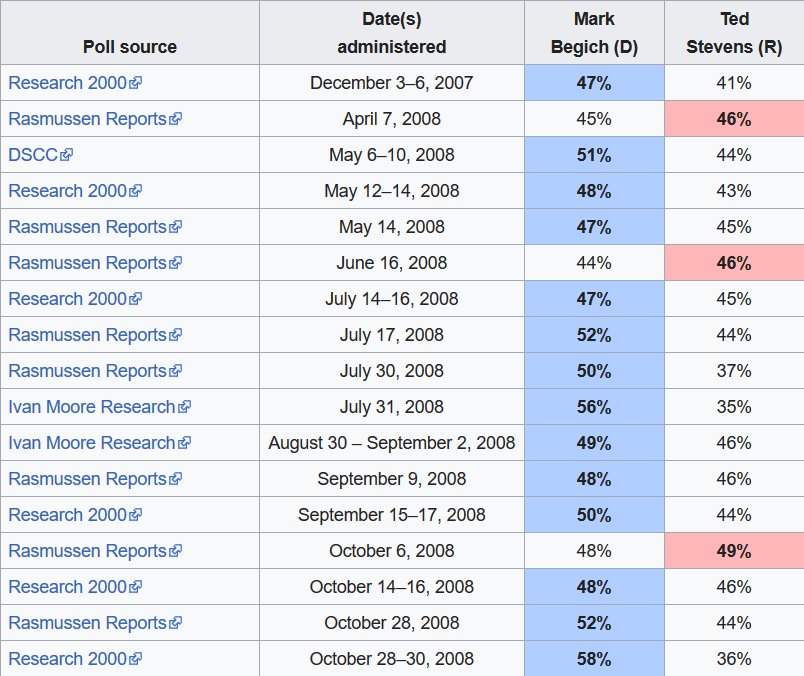
In 2014, Begich lost his reelection effort. But he lost by only 2.2% in a state which had drifted leftward a bit, but was still quite conservative (R+9), and in an environment that was terrible for Democrats.
Right now the Alaskan electorate is seriously riled up. In 2019, tens of thousands of Alaskans signed petitions to recall Republican governor Mike Dunleavy after he used line-item vetoes to slash more than $440 million from the state’s budget to bulk up the annual dividend paid to every state residents from funds generated through oil sales. The cuts devastated the young, the poor, and the old. Funding for the state’s university system was cut by 41%. Nearly $80 million in Medicaid funding was cut. $20 million was cut from senior benefits. While Dunleavy has rolled over on some of his cuts in the wake of the recall campaign, he has stood by many of them. On top of this, Alaska has had absolutely dumbfounding heatwaves that have shattered records, cooked salmon to death, and sparked more than 600 wildfires, making it clear that the state and its economic and social well-being is on the front line of the consequences of a warming planet.
While it appears that the recall efforts have stalled due to court rulings, even before Dunleavy starting shaking things up, there was some cursory polling evidence that Sullivan is beatable, as seen above. In addition, a couple months ago I threw together a quick chart looking at Republican vote share in Alaskan elections over the last 20 years.
Some of the data is kind of a mess, particularly with the Senate elections (here I included Murkowski’s races, and added her vote shares to her Republican/Libertarian competitor’s). But it’s worth some contemplation. Even if we accept that Stevens’ race in 2008 was significantly compromised by his felony convictions, there’s a lot of room for error. Had he won the race in 2008, winning that race by a margin of 13.8 points (which, with an unchanged 3rd party vote, would have produced a race where Stevens won 54.05% to Begich’s 40.25%) would have shifted the math in my approach only enough to make the 2020 race a tie. And thus, winnable.
But Democrats need to take steps to ensure that this is a one-on-one race versus Dan Sullivan, without a 3rd party spoiler. And it appears that Dems have done so, in kind of a round about way. On December 3, 2019, the Democratic Senatorial Campaign Committee endorsed Al Gross, an independent candidate. While some might argue that Dems went and spoiled things by tying Gross to them, I think this is a necessary move to signal to weak placeholder candidates that they aren’t welcome in the race, even if they slap a (D) next to their name. I would expect them to get more aggressive about keeping other candidates out of the race if anyone gets any clever ideas.
This will be a race to watch.
Polling:
| Pollster | Date Completed | Sullivan (R) | Gross (I) |
|---|---|---|---|
| PPP | 2020/08/28 | 43% | 43% |
| PPP | 2020/07/08 | 39% | 34% |
| Alaska Survey Research | 2020/07/07 | 50% | 43% |
Previous Elections:
- 2018 House: R – 53.08% / D – 46.50% / Margin – R+6.58%
- 2016 President: Trump (R) – 51.28% / Clinton (D) – 36.55% / Margin – R+14.73%
- 2016 Senate: Murkowski (R) – 44.36% / Miller (L) – 29.16% / Margin – R+15.2%
- 2016 House: R – 50.32% / D – 36.02% / Margin – R+14.30%
Arizona
- Incumbent: Martha McSally (R) – Appointed 2019 – $10.98 M cash on hand June 2020
- Challenger: Mark Kelly (D) – $23.94 M cash on hand June 2020
- My Rating: D+1.3 (Flip R -> D)
Martha McSally is a pretty weak candidate, who was appointed to the late John McCain’s Arizona Senate seat after being defeated by Krysten Sinema by a margin of 2.4%.
Mark Kelly, a former astronaut who also happens to be the husband of Gabby Giffords (who narrowly survived an assassination attempt in 2011). He has attracted a lot of attention, and managed to attract more donations than most Democratic presidential candidates. Kelly is a moderate with a compelling and unique story, which probably makes him an ideal fit for this race.
I originally calculated the margin for this race as R+1.9. But, that was calculated using data from a Senate election in 2010, as well as elections in 2014, 2016, and 2018. The 2010 race created something of a problem. In that race, McCain easily held his seat in an election where he faced off against a practically unknown Democratic candidate, Rodney Glassman, whose previous career highlight was serving as Tucson City councilman. The man doesn’t even have a Wikipedia page. But he apparently got beat by McCain so badly it turned him Republican. Sadly, his conversion did nothing to better his political fortunes. In 2018, he just baaaaaaaaaaaarely lost a race for one of the two seats up for grabs for the very prestigious Arizona Corporation Commission.
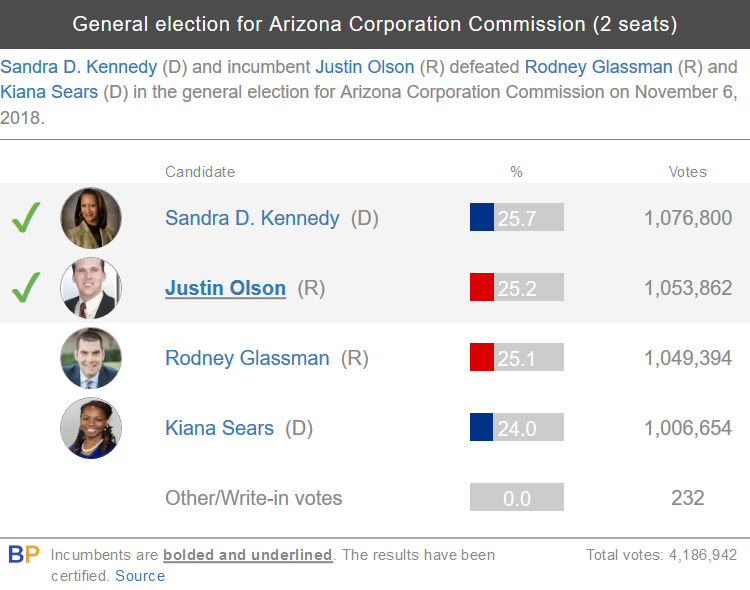
Anyways, where was I? Oh yes. McCain faced off against such a massively trash candidate that his big old honkin’ win probably skews the data. We’re fortunate enough to have data from three straight Arizona senate races in 2014, 2016, and 2018 (the only state with a Senate seat up for grabs in 2020 where that’s the case). Given this embarrassment of riches, I’m comfortable discarding the 2010 race.
When looking at the last 3 Senate races, the projected vote margin in 2020 is D+1.3. And based upon the trend in polling over the past few months, as well as the massive disparity in fundraising, Kelly has excellent odds of overperforming that margin (and Biden may well ride his coattails to victory at this rate).
Polling:
| Pollster | Date Completed | McSally (R) | Kelly (D) |
|---|---|---|---|
| Aug-Sep Avg | 41.6% | 50.8% | |
| Benenson Strategy | 2020/09/08 | 45% | 48% |
| Change Research | 2020/09/06 | 45% | 51% |
| Redfield & Wilton | 2020/09/04 | 38% | 53% |
| Fox News | 2020/09/01 | 39% | 56% |
| Redfield & Wilton | 2020/08/18 | 34% | 53% |
| Emerson College | 2020/08/10 | 41% | 52% |
| Change Research | 2020/08/09 | 43% | 49% |
| OnMessage Inc. | 2020/08/04 | 48% | 48% |
| OH Predictive | 2020/08/04 | 43% | 48% |
| Data for Progress | 2020/08/02 | 40% | 50% |
| Change Research | 2020/07/26 | 45% | 47% |
| Morning Consult | 2020/07/26 | 36% | 52% |
| CNN/SSRS | 2020/07/24 | 43% | 50% |
| Redfield & Wilton | 2020/07/23 | 35% | 53% |
| Marist College | 2020/07/22 | 41% | 53% |
| PPP | 2020/07/22 | 42% | 51% |
| Spry Strategies | 2020/07/16 | 41% | 48% |
| Change Research | 2020/07/12 | 45% | 52% |
| YouGov | 2020/07/10 | 42% | 46% |
| OH Predictive | 2020/07/07 | 43% | 52% |
| Data Orbital | 2020/06/29 | 43% | 50% |
| Change Research | 2020/06/28 | 44% | 53% |
| Gravis (OAN) | 2020/06/27 | 46% | 42% |
| Global Strategy Group | 2020/06/24 | 42% | 49% |
| Change Research | 2020/06/23 | 42% | 50% |
| Redfield & Wilton | 2020/06/17 | 34% | 49% |
| Siena College | 2020/06/16 | 38% | 47% |
| Civiqs | 2020/06/15 | 42% | 51% |
| Fox News | 2020/06/02 | 37% | 50% |
| Fox News | 2020/06/02 | 37% | 50% |
| Highground | 2020/05/22 | 41% | 51% |
| OH Predictive Insights | 2020/05/11 | 38% | 51% |
| OH Predictive Insights | 2020/04/08 | 42% | 51% |
| NBC/Marist | 2020/03/15 | 45% | 48% |
| Monmouth | 2020/03/14 | 44% | 50% |
| Univision | 2020/03/04 | 36% | 48% |
| OH Predictive Insights | 2020/03/04 | 42% | 49% |
| PPP (D) | 2020/03/03 | 42% | 47% |
| Highground | 2020/02/07 | 39% | 46% |
| PPP (D) | 2020/01/04 | 42% | 46% |
| OH Predictive Insights | 2019/12/04 | 44% | 47% |
| Emerson | 2019/10/28 | 45% | 46% |
Previous Elections:
- 2018 Senate: Sinema (D) – 49.96% / McSally (R) – 47.61% / Margin – D+2.35%
- 2018 House: D – 50.37% / R – 48.66% / Margin – D+1.71%
- 2016 President: Trump (R) – 49.03% / Clinton (D) – 45.46% / Margin – R+3.63%
- 2016 Senate: McCain (R) – 53.71% / Kirkpatrick (D) – 40.75% / Margin – R+12.96%
- 2016 House: R – 52.49% / D – 44.72% / Margin – R+7.77%
Arkansas
- Incumbent: Tom Cotton (R) – Won 2014 by 17.1% – $60.1 M cash on hand June 2020
- Challenger: No (D) Challenger – See below
Tom Cotton has two claims to fame: (1) he’s the second youngest member of the Senate, second only to Facebook hater Josh Hawley, and (2) he is not terribly well liked.
But the unfortunate reality is that despite the fact that Tom Cotton has been getting high on his own supply—as evidenced by his claim that he inspired Trump’s desire to buy Greenland—the state’s Republican leanings suggest that he won’t be vacating the Arkansas Senate seat in 2020.
Compounding the problem is that literally hours after the filing deadline, Democratic nominee Josh Mahoney dropped out of the race, stating only that he had a “family health concern” which necessitated that he withdraw from the race. The Arkansas Democratic Party has stated that it does not see a legal path toward replacing Mahoney, and thus Cotton will not face a Democratic candidate in November 2020.
Thus, regardless of how annoying Cotton is, unless something truly shocking happens, we’re stuck with the 42-year-old senator until shortly before the heat death of the universe.
Polling: None Available
Previous Elections:
- 2018 House: R – 62.56% / D – 35.19% / Margin – R+27.37%
- 2016 President: Trump (R) – 60.57% / Clinton (D) – 33.65% / Margin – R+26.92%
- 2016 Senate: Boozman (R) – 59.77% / Eldridge (D) – 36.17% / Margin – R+23.60%
- 2016 House: R – 71.16% / D – 10.42% / Margin – R+60.74%
Colorado
- Incumbent: Cory Gardner (R) – Won 2014 by 1.9% – $10.7 M cash on hand July 2020
- Challenger: John Hickenlooper (D) – $4.57 M cash on hand June 2020
- My Rating: D+13.7 (Flip R -> D)
In Colorado, incumbent Cory Gardner has widely been considered to be the most endangered Republican in the Senate. Election wonks largely have this race rated as a tossup. But, I think they’re on crack. Look at the shift in voting from 2016 to 2018, especially in the House races!
Colorado leans just a smidge to the left, but in a national climate like this, it’s deadly for Republicans. I anticipate a rather large margin of D+13.4 for Colorado in 2020. Gardner is the most endangered Republican in the Senate. Gardner won by less than 2 points in 2014, a year in which Republicans had a nearly 5 point advantage nationwide. In 2016, Hillary Clinton won the state by nearly 5 points, a year that was slightly favorable (R+1.1) to Republicans at the Congressional level. In 2020, Republicans are likely looking at a national mood where Dems will enjoy an average margin of 6% to 8% in their favor.
Hickenlooper has great name recognition in the state, and won both of his gubernatorial elections in years (2010 and 2014) where Democrats were at a 6 to 7 point disadvantage nationally. Regardless of the fact that he’s run a poor campaign, he’ll flatten Gardner.
Polling:
| Pollster | Date Completed | Gardner (R) | Hickenlooper (D) |
|---|---|---|---|
| Fabrizio Ward | 2020/09/05 | 46% | 51% |
| Morning Consult | 2020/08/30 | 39% | 48% |
| PPP | 2020/08/19 | 42% | 51% |
| Morning Consult | 2020/07/26 | 42% | 48% |
| PPP | 2020/06/30 | 40% | 51% |
| Keating Research (D) | 2020/05/03 | 36% | 54% |
| MSU | 2020/04/19 | 31% | 48% |
| KOM | 2019/10/14 | 42% | 53% |
| Emerson College | 2019/08/19 | 40% | 53% |
| Global Strategy (D) | 2019/08/14 | 39% | 49% |
| PPP (D) | 2019/08/11 | 38% | 51% |
Previous Elections:
- 2018 House: D – 53.43% / R – 42.95% / Margin – D+10.48%
- 2016 President: Clinton (D) – 48.16% / Trump (R) – 43.25% / Margin – D+4.91%
- 2016 Senate: Bennet (D) – 49.97% / Glenn (R) – 44.31% / Margin – D+5.66%
- 2016 House: R – 47.70% / D – 46.78% / Margin – R+0.92%
Delaware
- Incumbent: Chris Coons (D) – Won 2014 by 13.6% – $2.84 M cash on hand Q1 2020
- Challenger: (Possible) Lauren Witzke (R) – $0.01 M cash on hand Q1 2020
- Challenger: (Possible) James DeMartino (R) – $0.02 M cash on hand Q1 2020
- Primary Date: September 15, 2020
- My Rating: D+29.8 (Hold)
Delaware is pretty liberal. “How liberal,” you ask? As late as Winter of 2019, the Republican candidates for the Delaware Senate seat were:

*crickets* Zero. Zero Republican candidates. No tenemos candidatos. Since then, it appears that someone named Lauren Witzke, described on Wikipedia as a “conservative activist,” has come on the scene. Despite the fact that the FEC filing deadline has passed, there’s no information as to what campaign funds she has raised. But she appears to be something of a mix of old school 1980s religious conservative and contemporary Trumpian. She completed Ballotpedia’s Candidate Connection survey, which can be seen here. And after Witzke another candidate appeared: James DeMartino. Job description? “2016 political candidate.” Well. That sounds super promising.
As of April 2020, their fundraising doesn’t exactly inspire confidence. As of the end of Q1 2020, DeMartino’s campaign has $20,589.70 in cash on hand, while Witzke has the grand sum of $7,294.26 to play around with, which might be sufficient for taking a shot at an empty seat on her local city council, but that’s about it.
There are myriad reasons to explain why Delaware isn’t attracting candidates with experience in government, let alone heavy hitters with the ability to tap into well-heeled fundraising networks.
Delaware isn’t even in the top-10 list of most Democratic states (D+6), but Democrats control every branch of the Delaware state government, and both of their senators and their single House representative are all Democrats. Chris Coons could draw his face on a bag of flour and have it handle all the campaigning, and he would still win by 20 points.
It doesn’t hurt that Coons is pretty moderate, and thus makes it a little more difficult to be challenged from the right.
Polling: None Available
Previous Elections:
- 2018 Senate: Carper (D) – 59.95% / Arlett (R) – 37.81% / Margin – D+22.14%
- 2018 House: D – 64.45% / R – 35.55% / Margin – D+28.90%
- 2016 President: Clinton (D) – 53.09% / Trump (R) – 41.72% / Margin – D+11.37%
- 2016 House: D – 55.52% / R – 40.96% / Margin – D+14.56%
Georgia
- Incumbent: David Perdue (R) – Won 2014 by 7.7% – $9.05 M cash on hand Q1 2020
- Challenger: Jon Ossoff (D) – $1.83 M cash on hand Q1 2020
- Special Election: Kelly Loeffler (R) Appointed January 2020 – $6.10 M cash on hand Q1 2020
- Challenger: Doug Collins (R) – $2.22 M cash on hand Q1 2020
- Challenger: Rev. Raphael Warnock (D) – $1.17 M cash on hand Q1 2020
- My Rating: R+0.9 (Hold)
Georgia is a state where Democrats have grown despondent about their odds, especially in the wake of the 2018 gubernatorial race between Brian Kemp and Stacey Abrams. It doesn’t help that Democrats have struggled here in Senate races over the last few years.
Democrats haven’t helped themselves either, tending to run relatively undistinguished candidates with little political experience. But the state has relatively mild Republican support, with a PVI of R+5 and a SED of R+4.2. Donald Trump won the state in 2016 by only 5.09%, the smallest margin of victory for a Republican presidential candidate since Bob Dole in 1996. In this political environment, the projected Senate margin is only R+1.2.
Incumbent David Perdue is not a particularly strong candidate either, given that he won in 2014 by less than 8 points, in a year when the national environment favored Republicans by nearly 8 points. His opponent is Jon Ossoff, who previously ran in the 2017 special election for U.S. House seat in Georgia’s 6th Congressional District, only to narrowly lose by about 3 points to Karen Handel (who in turn lost to Lucy McBath in 2018), will be the Democratic nominee for the seat.
And Perdue’s seat is not the only one in play. There is an interesting wrinkle in the 2020 Georgia Senate election. On August 28, 2019, Senator Johnny Isakson, who had held one of Georgia’s two Senate seats since 2005, retired due to health issues, including advancing Parkinson’s disease.
The question of who would fill Isakson’s seat was a contentious one. President Donald Trump and has cabinet had voiced their preference for Georgia Representative Doug Collins. However, Kemp ultimately opted to go with his preferred candidate, Kelly Loeffler, a wealthy businesswoman who is CEO of asset management company Bakkt, and co-owner of the Atlanta Dream, a WNBA team.
However, there’s now a potential civil war brewing in the Georgia Republican Party, as Doug Collins announced less than a month after Loeffer’s appointment that he would run for the Senate seat that Kemp had denied him. Nearly simultaneous to Collins’ announcement, Reverend Raphael Warnock, pastor of Atlanta’s Ebenezer Baptist Church—where Rev. Martin Luther King was a pastor for 8 years in the 1960s—announced that he would run for the seat as well, as a Democrat. He quickly gained the endorsement of Stacey Abrams, which makes it clear that Democrats in the state will try to prevent others from entering the race.
And what was already a race primed for absolute madness became even more so in the wake of the revelation that Loeffler dumped millions of dollars in stock after sitting in on classified briefings in late January on the potential threat posed by the disease now known as COVID-19. During that same time, she purchased an intriguing mix of stocks, including stock in a teleconferencing software company. Her Republican opponent hasn’t exactly avoided making note of her investment choices, and so the primary may prove to be quite interesting, indeed.
But, there will not be a primary election for Loeffler’s seat. Instead, all candidates will run in a single jungle primary on the day of the general election. If nobody wins a majority of the votes, the top two candidates will advance to a runoff election in January.
Georgia will serve as an interesting demonstration of the advantage that an elected incumbent has versus an unelected one. You only have to look back at Minnesota’s doubleheader Senate election in 2018 for a similar example.
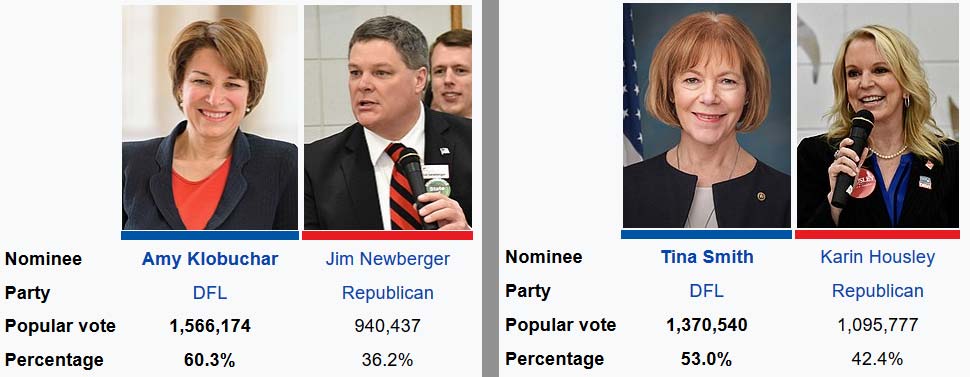
Klobuchar’s opponent got smoked by more than 24 points, while Tina Smith—appointed in January 2018 to fill out the remainder of Al Franken’s term after he resigned—won by a relatively narrow 10.6% margin. Same state, same day, but a difference of 13.5 points between the two margins.
As mentioned, Georgia is most definitely not a gimme for Democrats, despite being a Democratic stronghold for many years. Georgia is unlikely to become an easy pickup for Democrats anytime soon, as a Democratic candidate hasn’t won a Senate race in Georgia since Zell Miller in 2000, and Miller wasn’t exactly a lefty.
But Democrats have a fighting chance. Georgia is definitely a better bet for Democrats than states that are much longer reaches like Kentucky and Texas.
Polling for Senate Election:
| Pollster | Date Completed | Perdue (R) | Ossoff (D) |
|---|---|---|---|
| July-Aug Average | 45.0% | 43.5% | |
| Fabrizio Ward | 2020/09/05 | 47% | 48% |
| PPP (D) | 2020/08/14 | 44% | 44% |
| Garin-Hart-Yang (D) | 2020/08/13 | 46% | 48% |
| SurveyUSA | 2020/08/08 | 44% | 41% |
| HIT Strategies (D) | 2020/07/31 | 39% | 42% |
| YouGov | 2020/07/31 | 45% | 43% |
| Monmouth | 2020/07/27 | 49% | 43% |
| Morning Consult | 2020/07/26 | 45% | 42% |
| Spry Strategies (R) | 2020/07/16 | 46% | 44% |
| Garin-Hart-Yang (D) | 2020/07/15 | 44% | 45% |
| Gravis (R) | 2020/07/02 | 48% | 43% |
| Fox News | 2020/06/23 | 45% | 42% |
| PPP (D) | 2020/06/13 | 44% | 45% |
| Civiqs | 2020/05/18 | 45% | 47% |
| BK Strategies (R) | 2020/05/13 | 46% | 41% |
| Public Opinion Strat (R) | 2020/05/07 | 43% | 41% |
| Cygnal | 2020/04/27 | 45% | 39% |
Polling for Special Senate Election:
| Pollster | Date Completed | Loeffler (R) | Collins (R) | Warnock (D) | Lieberman (D) |
|---|---|---|---|---|---|
| July-Aug Average | 23.0% | 21.4% | 13.6% | 13.4% | |
| Fabrizio Ward | 2020/09/05 | 24% | 20% | 19% | 10% |
| SurveyUSA | 2020/08/08 | 26% | 17% | 17% | 13% |
| HIT Strategies (D) | 2020/07/31 | 22% | 18% | 14% | 14% |
| Monmouth | 2020/07/27 | 26% | 20% | 9% | 14% |
| Battleground (R) | 2020/07/08 | 17% | 26% | 10% | 15% |
| Gravis (R) | 2020/07/02 | 24% | 26% | 18% | 11% |
| PPP (D) | 2020/06/26 | 21% | 23% | 20% | 11% |
| MRG Research (D) | 2020/06/23 | 21% | 27% | 23% | 13% |
| Civiqs | 2020/05/18 | 12% | 34% | 18% | 14% |
| Public Opinion (R) | 2020/05/07 | 18% | 19% | 9% | 17% |
| Cygnal | 2020/04/27 | 11% | 29% | 11% | 12% |
| Battleground Connect (R) | 2020/04/01 | 13% | 36% | 16% | 11% |
| Battleground Connect (R) | 2020/03/24 | 14% | 34% | 13% | 18% |
| University of Georgia | 2020/03/02 | 19% | 21% | 6% | 11% |
Previous Elections:
- 2018 House: R – 52.27% / D – 47.73% / Margin – R+4.54%
- 2016 President: Trump (R) – 50.44% / Clinton (D) – 45.35% / Margin – R+5.09%
- 2016 Senate: Isakson (R) – 54.80% / Barksdale (D) – 41.04% / Margin – R+13.76%
- 2016 House: R – 60.26% / D – 39.74% / Margin – R+20.52%
Idaho
- Incumbent: Jim Risch (R) – Won 2014 by 30.7% – $2.23 M cash on hand Q1 2020
- Challenger: Paulette Jordan (D) – $0.04 M cash on hand Q1 2020
- My Rating: R+26.5 (Hold)
Idaho is an almost unbelievably conservative state. A Democrat hasn’t won a Senate race in the state since 1974. That isn’t going to change in 2020.
My projection (R+26.5) calls for what is a relatively close race in Idaho, though almost perfectly in line with how the state voted in House races in 2018.
Polling:
| Pollster | Date Completed | Risch (R) | Jordan (D) |
|---|---|---|---|
| Spry | 2020/09/01 | 53% | 28% |
Previous Elections:
- 2018 House: R – 61.73% / D – 34.83% / Margin – R+26.90%
- 2016 President: Trump (R) – 59.25% / Clinton (D) – 27.48% / Margin – R+31.77%
- 2016 Senate: Crapo (R) – 66.13% / Sturgill (D) – 27.73% / Margin – R+38.40%
- 2016 House: R – 65.66% / D – 30.66% / Margin – R+35.00%
Illinois
- Incumbent: Dick Durbin (D) – Won 2014 by 10.9% – $5.08 M cash on hand Q1 2020
- Challenger: Mark Curran (R) – $0.01 M cash on hand Q1 2020
- My Rating: D+23.9 (Hold)
Since 1984, a grand total of two Republicans have won Senate seats in Illinois: Peter Fitzgerald, who retired in 2004 and was replaced by some guy named Barack Obama, and Mark Kirk, who won Obama’s seat but then lost to Tammy Duckworth in 2016. Both only served a single term.
On the other end of the electoral extreme, Dick Durbin has held his seat since 1997. There’s no evidence that there’s anything stopping him from winning his fifth straight election in 2020 (and likely by the second-largest margin of his career).
Polling: None Available
Previous Elections:
- 2018 House: D – 60.74% / R – 38.65% / Margin – D+22.09%
- 2016 President: Clinton (D) – 55.83% / Trump (R) – 38.76% / Margin – D+17.07%
- 2016 Senate: Duckworth (D) – 54.86% / Kirk (R) – 39.78% / Margin – D+15.08%
- 2016 House: D – 53.62% / R – 45.74% / Margin – D+7.88%
Iowa
- Incumbent: Joni Ernst (R) – Won 2014 by 8.3% – $6.49 M cash on hand Q1 2020
- Challenger: Theresa Greenfield (D) – $3.83 M cash on hand Q1 2020
- My Rating: R+4.9 (Hold)
Iowa has long been a bellwether state, with its margins in presidential elections tending to be pretty close to the national sentiment. But in recent years the state has been reddening. Donald Trump won Iowa by nearly 10 points in 2016, despite losing the national popular vote.
Iowa now has a PVI of R+3, and has recently favored Republican senatorial candidates (SED of R+9.9). The Republican incumbent is favored in the 2020 Senate election in Iowa, but Democrats aren’t necessarily without hope, given the state of the state’s economy.
Iowa is either the country’s largest or second-largest producer of soybeans, depending on who you ask. Either way, it’s a crop that’s been square in the cross hairs of Trump’s trade war with China. This, on top of terrible flooding and record rainfall in 2019, has seriously hurt the state’s economic fortunes.
Voters seem to have noticed. In 2018, Democrats went from holding one of Iowa’s 4 House seats, to winning 3 of them, and coming within 2.6% of flipping Steve King’s R+11 district as well. And Ernst is not a profoundly strong candidate. She won by a little over 8 points in 2014, a year that favored Republicans nationwide by an average of nearly 6 points.
I think Ernst is definitely favored, as evidenced by the R+4.9 margin, but if Democrats can repeat their 2018 performance in the House elections with the 2020 Senate election, Democrats can take this seat.
But please note that the comparison between the Senate and House races does warrant some caution. Part of the reason for the strong Democratic performance was an unusually close race in Iowa’s 4th Congressional District, where the unabashedly racist and sexist Steve King only won by a little over 3 points, in contrast to the margins of more than 20 points by which he won in 2014 and 2016.
I think a lot is going to ride on what Iowa’s economy looks like in November of 2020.
Polling:
| Pollster | Date Completed | Ernst (R) | Greenfield (D) |
|---|---|---|---|
| July-Aug Average | 43.0% | 44.6% | |
| Fabrizio Ward | 2020/09/05 | 50% | 45% |
| PPP (D) | 2020/08/14 | 45% | 48% |
| Monmouth | 2020/08/03 | 48% | 45% |
| Data for Progress | 2020/08/02 | 43% | 45% |
| RMG Research | 2020/07/30 | 36% | 40% |
| Spry Strategies (R) | 2020/07/16 | 43% | 45% |
| GQR Research (D) | 2020/06/28 | 47% | 49% |
| Selzer & Co. | 2020/06/10 | 43% | 46% |
| Civiqs | 2020/06/08 | 45% | 48% |
| PPP (D) | 2020/06/04 | 43% | 45% |
| PPP (D) | 2020/05/01 | 43% | 42% |
| PPP (D) | 2019/12/15 | 47% | 41% |
| Emerson Polling | 2019/10/16 | 47% | 40% |
| Lake Research (D) | 2019/04/29 | 56% | 34% |
Previous Elections:
- 2018 House: D – 50.49% / R – 46.51% / Margin – D+3.98%
- 2016 President: Trump (R) – 51.15% / Clinton (D) – 41.74% / Margin – R+9.41%
- 2016 Senate: Grassley (R) – 60.09% / Judge (D) – 35.66% / Margin – R+24.43%
- 2016 House: R – 53.65% / D – 44.47% / Margin – R+9.18%
Kansas
- Incumbent: None (R) – Pat Roberts retiring, won 2014 by 10.6%
- Challenger: Roger Marshall (R) – $1.95 M cash on hand Q1 2020
- Challenger: Barbara Bollier (D) – $2.40 M cash on hand Q1 2020
- Primary Date: August 4, 2020
- My Rating: R+19.1 (Hold)
Of all the Senate elections in very hard-and-fast Republican-controlled states, the one that merits the closest watching by Democrats is Kansas. Incumbent Pat Roberts is retiring. Many watched this race with bated breath, as one of the prominent Republicans to throw their hat into the ring was Kris Kobach. If you don’t remember him, Kris Kobach served as Secretary of State from 2011 to 2019 under Governor Sam Brownback.
Kobach was the Republican nominee to succeed Brownback as governor in 2008. AND HE LOST BY 5%. Yes, to an actual Democrat.
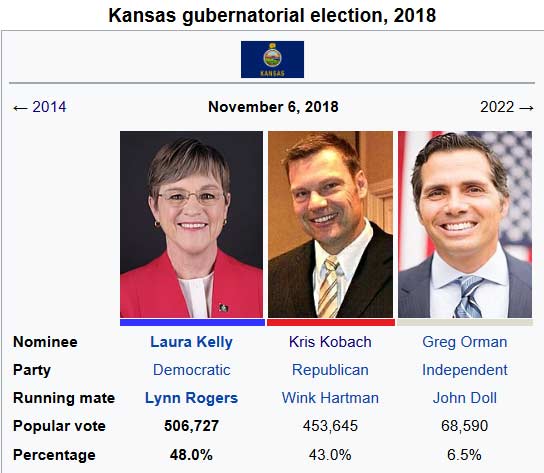
But Kansas Republicans dodged a bullet, instead choosing to nominate Roger Marshall, the sitting representative from the state’s 1st district.
Kansas is a verrrrrrrrrrrry red state. It hasn’t elected a Democratic senator since 1932. It does flirt with the occasional Democrat, but mostly at the state level.
It should be noted: I have long argued that if Kobach didn’t win the nomination, that Democrats shouldn’t bother investing in this race.
However, a new wrinkle emerged. State senator Barbara Bollier declared her candidacy in late 2019. Bollier is a particularly interesting candidate, as for nearly ten years she served in the Kansas House of Representatives as a Republican. However, in late 2018, she along with two other Kansas politicians switched over to the Democratic Party in response to concerns about the direction of the party in the wake of the presidency of Donald Trump.
Bollier appears to have real traction. She’s been quite successful at raising funds, despite running in a race that doesn’t get a lot of attention at the national level, and her polling has consistently been within a couple points of the Republican candidates. In saner, more normal times I would say that it’s pointless to waste time on this seat, but recent history suggests that perhaps we should pay closer attention to this race.
Polling:
| Pollster | Date Completed | Marshall (R) | Bollier (D) |
|---|---|---|---|
| SurveyUSA | 2020/08/09 | 46% | 44% |
| PPP (D) | 2020/08/06 | 43% | 42% |
| Civiqs | 2020/06/01 | 42% | 41% |
Previous Elections:
- 2018 House: R – 53.95% / D – 43.89% / Margin – R+10.06%
- 2016 President: Trump (R) – 56.16% / Clinton (D) – 35.74% / Margin – R+20.42%
- 2016 Senate: Moran (R) – 62.18% / Wiesner (D) – 32.24% / Margin – R+29.94%
- 2016 House: R – 59.15% / D – 27.06% / Margin – R+32.09%
Kentucky
- Incumbent: Mitch McConnell (R) – Won 2014 by 15.5% – $14.97 M cash on hand Q1 2020
- Challenger: Amy McGrath (D) – $14.77 M cash on hand Q1 2020
- Primary Date: June 23, 2020
- My Rating: R+6.4 (Hold)
In spite of my projection for the Kentucky Senate race being pretty tight, I think this race is a long shot. Republicans will happily pour tens of millions of dollars into the race to protect Senate Majority Leader Mitch McConnell. And if prominent Democratic challenger Amy McGrath wins the Democratic nomination, as seems likely, she’ll be a mess. Her campaign thus far has looked FUBARed as all hell.
To be fair, McConnell’s electoral strength has varied wildly over the years. When he was first elected to the Senate in 1984, he won by only 0.4%. His high water mark was in 2002, when he won by nearly 30%. Six years later, in 2008, he won by less than 6%.
In addition, at the state level, Democrats seem to have the wind at their backs. Republican Governor Matt Bevin has been consistently ranked as the least popular governor in the country, and recent polls have shown him several points behind likely Democratic challenger Andy Beshear, the state’s current attorney general. Democratic internal polling has also shown Democratic candidates leading in the state’s attorney general and secretary of state races.
But voters often make significantly different choices in state versus federal elections. Mitch McConnell will be 78 years old on Election Day 2020, and I think all signs indicate that his likely electoral swan song will be a close race. But I remain unconvinced that Democrats will be able to overcome both the Republican Party’s commitment to holding this seat, and Kentucky’s inherent conservatism, especially if McGrath proves to be as problematic of a nominee as I suspect. I would be much happier if national Democrats get out of the way and let the Kentucky Democratic Party do its thing and instead focus national attention on more feasible races.
Polling:
| Pollster | Date Completed | McConnell (R) | McGrath (D) |
|---|---|---|---|
| July-Aug Average | 50.2% | 40.4% | |
| Quinnipiac | 2020/08/03 | 49% | 44% |
| Morning Consult | 2020/08/02 | 53% | 36% |
| Bluegrass Data (D) | 2020/07/29 | 49% | 46% |
| Spry Strategies (R) | 2020/07/16 | 55% | 35% |
| Garin-Hart-Yang (D) | 2020/07/12 | 45% | 41% |
| Civiqs | 2020/06/15 | 53% | 33% |
| RMG Research | 2020/05/24 | 40% | 41% |
| Change Research (D) | 2020/01/21 | 41% | 41% |
| Garin-Hart-Yang (D) | 2020/01/13 | 43% | 40% |
| Fabrizio Ward | 2019/07/31 | 47% | 46% |
Previous Elections:
- 2018 House: R – 59.59% / D – 39.05% / Margin – R+20.54
- 2016 President: Trump (R) – 62.52% / Clinton (D) – 32.68% / Margin – R+29.84%
- 2016 Senate: Paul (R) – 57.27% / Gray (D) – 42.73% / Margin – R+14.54%
- 2016 House: R – 70.70% / D – 29.28% / Margin – R+41.42%
Louisiana
- Incumbent: Bill Cassidy (R) – Won 2014 by 11.9% – $5.87 M cash on hand Q1 2020
- Challenger: (Possibly) Antoine Pierce (D) – $0.00 M cash on hand Q1 2020
- Primary Date: Louisiana-Style Primary on November 3, 2020
- My Rating: R+5.0 (Hold)
Louisiana has a very long history as a Democratic stronghold. When David Vitter won his race in 2004, he was the first Republican in 125 years elected to one of Louisiana’s Senate seats. But like many Southern and Midwest states, it’s drifted right in recent years.
I think my projection overstates the odds of a Democrat defeating incumbent Bill Cassidy, especially due to the state’s unique primary, which occurs on the date of the national election. All candidates who have declared for the race run in the same primary. This is what the Lousiana Senate primary looked like in November, 2014:
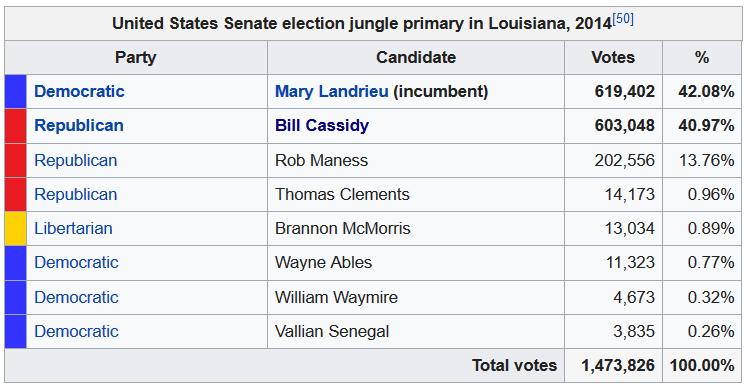
If anyone gets a majority of the votes (50% + 1), they win the Senate seat. Otherwise, the top two candidates face off in runoff a month or two later (in 2020, the runoff will be on December 5). Things can change drastically between the first election and the runoff as voters consolidate support. While incumbent Mary Landrieu won the primary by a little over a point, she ultimately lost to Bill Cassidy by nearly 12%.
Thus, a Democratic candidate can’t rely on Republicans splitting support between Cassidy and another Republican. And if Donald Trump happens to lose on election day, the odds would be stacked even higher against the Democrat in the runoff. For Democrats to have any shot at this, they would have to nominate a reasonably strong candidate with good name recognition, such as former mayor of New Orleans Mitch Landrieu (who is Mary Landrieu’s brother).
Polling: None Available
Previous Elections:
- 2018 House: R – 57.21% / D – 37.87% / Margin – R+19.34
- 2016 President: Trump (R) – 58.09% / Clinton (D) – 38.45% / Margin – R+19.64%
- 2016 Senate: Kennedy (R) – 60.65% / Campbell (D) – 39.35% / Margin – R+21.30%
- 2016 House: R – 66.44% / D – 31.26% / Margin – R+35.18%
Maine
- Incumbent: Susan Collins (R) – Won 2014 by 37.0% – $5.61 M cash on hand Q1 2020
- Challenger: Sara Gideon (D) – $4.65 M cash on hand Q1 2020
- Primary Date: June 9, 2020
- My Rating: R+2.0 (Hold)
Truth be told, I don’t trust my own projection here. Susan Collins won in 2014 by 37 points, and hasn’t had a race where her margin of victory has been in the single digits since her initial run in 1996, where she won by a little over 5 points.
Complicating the matter, it’s hard to get a bead on things by looking at Maine’s other Senate seat, as Angus King runs as an independent, and thus squares off against both Republican and Democratic challengers.
The case for Collins losing is predicated on the fact that she shattered her previously very Maine-friendly role as a moderate Republican with a passion for bipartisanship when she chose to give a seemingly interminable speech on the floor of the Senate on October 5th, 2018, where she announced that she would vote in favor of confirming the embattled Brett Kavanaugh to the Supreme Court.
This has been compounded by her often-mocked willingness to shrug off whatever the latest Republican or Trumpian controversy is by paying lip service to being “uncomfortable” or “disappointed” or “dismayed,” and following up with a very sternly worded letters to the offenders.
Consequently, her approval ratings have tanked. In only a few years, she has gone from being one of the most popular senators in the country, to being in the hole, approval-wise.
When I wrote the first version of this article, Collins’ support was at a net of -4% for all voters, -40% for Democrats, -2% for independents, and +27% for Republicans. Since then, her standing with all four groups has dropped:
- All Voters: Down 6% to -10%
- Democrats: Down 8% to -48%
- Independents: Down 8% to -10%
- Republicans: Down 4% to +23%
But at the end of the day, Collins has a history of winning comfortably. She can afford to lose a lot of ground and still win. History is on her side.
Collins won her previous race in 2014 by 37 points. For perspective, looking at every incumbent who lost over the last five Senate elections (2010-2018), the largest margin by which a losing senator won their previous election against a major candidate was 23.42%. This occurred when Republican Kelly Ayotte won her 2010 Senate race 60.16% to 36.74%, only to lose by 0.15% in 2018. Collins would have to experience a significantly worse collapse in support to lose her race.
How far back do you have to go to find a Senator who had a comparable fall from grace? You have to go back to the 2008 Alaska Senate election, where newly convicted felon Ted Stevens lost after having won by more than 67% in 2002 against a nobody, to find a senator who had a greater electoral downfall.
And what about Senate races where the opponent isn’t conveniently saddled with a minty fresh felony conviction? You gotta go all the way back to eighties. In 1980, Republican Mark Andrews won an open Senate race in North Dakota by a bit more than 41.3%. Six years later, in 1986, he lost by a margin of 2,120 votes (0.73%) to Democratic candidate Kent Conrad. Conrad went on to serve in the Senate for another 26 years.
Senators typically know when their time is up. The vast majority of the time, when a Senate seat is flipped, the previous incumbent has retired. It is relatively rare for a strong incumbent to be forcibly tossed out, and Collins has opted to run for reelection. Hence my intense skepticism about Collins losing this race. Collins looks strong in what little polling there is for this race. But if her fortunes seriously sour, I think it’s much more likely that Collins would call it a day. In that case, I think it’s likely that a fresh-faced Republican candidate would take the hit to their reputation by becoming the first Republican in 32 years to lose to a Senate race in Maine to a Democratic candidate. (Maybe Dems would have a better chance if they found someone willing to run as an independent, while promising to caucus with the Democrats!)
However, there’s one other interesting wrinkle here: instant-runoff voting (a variant of ranked-choice voting). In 2016, citizens of Maine passed Maine Question 5, a referendum which called for the implementation of an instant-runoff voting (IRV) system for primary and general elections for state governor, state legislature, U.S. Senate, and the U.S. House of Representatives.
While the new law has been subject to repeated efforts by the state’s legislature to repeal or diminish the scope of the law, with these efforts being countered by June 2018 Maine Question 1, a “people’s veto” referendum overturning a vote by the legislature to delay implementation of the IRV system. While the continued existence of the IRV system is in some doubt, it will still be in place for the 2020 Senate election.
Okay, but what is IRV? Basically, for any election in Maine subject to the IRV system, voters don’t just choose a single candidate. They rank all the candidates, from first choice to last. Here’s what the ballot looked like for the election for U.S. Representative for Maine’s 2nd Congressional District in 2018:
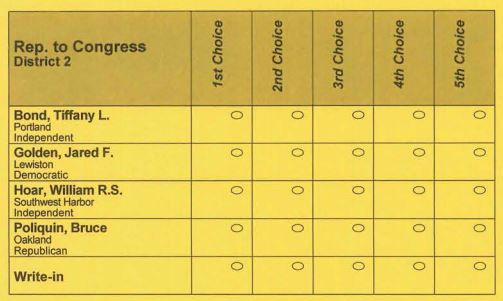
When the results of an election are initially tabulated, only the first choice votes are counted. If someone gets a majority of votes (50% +1), then they win the election. For instance, Maine Senator Angus King got 54.3% of the first round of voting. He was declared the winner, and the second, third, etc. choice votes were not counted.
But the runoff system did come into play for the 2nd Congressional District. After the first round of voting was counted, incumbent Bruce Poliquin led the race.

But Poliquin did not have a majority. Thus, the subsequent rounds of voting preferences had to be tabulated. Poliquin of course immediately immediately filed a lawsuit against the state’s secretary of state, alleging that the runoff system was unconstitutional. The fight dragged on for some time, but he ultimately lost his case.
With Maine’s ranked choice system, in each round of vote preference tabulation, the weakest candidate is given the boot, and their votes are redistributed to other candidates based upon who their supporters’ second choices were. Using this process, independent candidate Will Hoar’s votes were reallocated, and then the same was done with Tiffany Bond’s.
This was not a riveting process, as it basically involves loading all the data into a fancy Excel spreadsheet and then pushing a button to crunch the numbers. Lest you think I’m kidding about the Excel spreadsheet, here’s the video of the electronic vote tabulation posted by Maine’s Department of the Secretary of State on Facebook:
Ultimately, Democratic challenger Jared Golden won the race by 1.24%. Despite the court fights, the IRV system itself worked in wonderfully boring, reliable fashion, as should always be the case with vote-counting systems.
And the IRV system will be in place for Maine’s 2020 Senate fight. This means if Collins proves to have a tough fight on her hands, she can’t skate by with a plurality of the vote with the help of useful third party candidates. At the end of the day, she has to beat her Democratic challenger in a one-on-one fight. And that’s a gamble she’s likely to win.
Polling:
| Pollster | Date Completed | Collins (R) | Gideon (D) |
|---|---|---|---|
| July-Aug Average | 41.8% | 46.5% | |
| Citizen Data | 2020/09/07 | 41% | 49% |
| Fabrizio Ward | 2020/09/05 | 48% | 48% |
| PPP (D) | 2020/08/14 | 44% | 49% |
| Critical Insights | 2020/08/09 | 38% | 43% |
| Quinnipiac | 2020/08/03 | 43% | 47% |
| Data for Progress | 2020/08/02 | 45% | 48% |
| RMG Research | 2020/08/02 | 41% | 48% |
| Colby College | 2020/07/24 | 39% | 44% |
| PPP | 2020/07/23 | 42% | 47% |
| PPP | 2020/07/03 | 42% | 46% |
| Moore Info (R) | 2020/06/24 | 45% | 37% |
| Victory Geek (D) | 2020/05/18 | 42% | 51% |
| PPP | 2020/03/03 | 43% | 47% |
| Colby College | 2020/02/13 | 42% | 43% |
| Fabrizio Ward | 2019/07/31 | 52% | 35% |
| Gravis Marketing | 2019/06/24 | 52% | 36% |
| Pan Atlantic Research | 2019/03/13 | 51% | 29% |
Previous Elections:
- 2018 Senate: King (I/D) – 54.31% / Brakey (R) – 35.23% / Margin – I+19.08%
- 2018 House: D – 55.12% / R – 40.12% / Margin – D+15.00%
- 2016 President: Clinton (D) – 47.83% / Trump (R) – 44.87% / Margin – D+2.96%
- 2016 House: D – 51.93% / R – 48.01% / Margin – D+3.92%
Massachusetts
- Incumbent: Ed Markey (D) – Won 2014 by 23.9% – $4.43 M cash on hand Q1 2020
- Challenger: Shiva Ayyadurai (R) – $0.09 M cash on hand Q1 2020
- My Rating: D+23.4 (Hold)
While Massachusetts does have a Republican governor, the state is pretty darn liberal when it comes to federal elections. All 9 House members hailing from Massachusetts are Democrats, and in the last 40 years, the only Republican to win a Senate seat was Scott Brown in a special election in 2010, one of the worst years for Democrats in the last several decades. Brown was promptly ousted by Elizabeth Warren two years later.
Incumbent Ed Markey has nothing to fear from Republicans in 2020. Who he did have to fear was Joe Kennedy III, grandson of Bobby Kennedy and one of the nine aforementioned Massachusetts representatives. On August 26, 2019, Joe Kennedy III stated that he was considering challenging Markey for his Senate seat, and on the same day organized a campaign committee and filed a statement of candidacy with the Federal Election Commission. Kennedy ultimately did run for the seat, and a year and 6 days later, he became the first member of the Kennedy family to lose an election in Massachusetts, amassing 44.6% of the vote to Markey’s 55.4%.
Unless Markey gets hit by a bus before then, he’ll stroll back into the Senate in January.
Polling: None Available
Previous Elections:
- 2018 Senate: Warren (D) – 60.34% / Diehl (R) – 36.17% / Margin – D+24.17
- 2018 House: D – 78.21% / R – 20.03% / Margin – D+58.18%
- 2016 President: Clinton (D) – 60.01% / Trump (R) – 32.81% / Margin – D+27.20%
- 2016 House: D – 79.73% / R – 15.34% / Margin – D+64.39%
Michigan
- Incumbent: Gary Peters (D) – Won 2014 by 13.3% – $8.75 M cash on hand Q1 2020
- Challenger: John James (R) – $8.58 M cash on hand Q1 2020
- Primary Date: August 4, 2020
- My Rating: D+19.7 (Hold)
In 2018, Democrat Debbie Stabenow held her Michigan Senate seat by a margin of only 6.5 points against challenger John James. James impressed many with his performance, despite being a political novice. He has announced he’s running again in 2020, and will likely win the Republican Primary and square off against incumbent Gary Peters.
Gary Peters is the only incumbent Democrat fighting to hold a state that Trump won in 2020, so Democrats won’t be thrilled to face James again in 2020.
But Stabenow ran a very quiet campaign in which she rarely if ever deigned to go after James (in part because his campaign was quite underfunded compared to hers, and he wasn’t expected to close the gap as much as he did). Michigan Democrats won’t sleep on this race in 2020, and will come out for James with the long knives this time around. And this time around, they’ll likely have the national sentiment at their back. Whereas with 2016’s relatively neutral playing ground and Trump’s unexpectedly effective appeal to the state, it still wasn’t enough to win the state’s Senate seat.
Polling:
| Pollster | Date Completed | Peters (D) | James (R) |
|---|---|---|---|
| July-Aug Average | 48.7% | 40.3% | |
| Trafalgar Group (R) | 2020/08/23 | 47% | 48% |
| Change Research | 2020/08/23 | 50% | 45% |
| Redfield & Wilton | 2020/08/18 | 48% | 39% |
| Tarrance Group (R) | 2020/07/30 | 49% | 44% |
| Change Research | 2020/08/09 | 48% | 45% |
| EPIC-MRA | 2020/07/30 | 50% | 40% |
| PPP (D) | 2020/07/29 | 47% | 39% |
| Change Research | 2020/07/26 | 48% | 44% |
| Morning Consult | 2020/07/26 | 49% | 35% |
| CNN/SSRS | 2020/07/24 | 54% | 38% |
| Redfield & Wilton | 2020/07/24 | 52% | 35% |
| Gravis | 2020/07/22 | 49% | 39% |
| MRG | 2020/07/21 | 41% | 34% |
| Fox News | 2020/07/20 | 48% | 38% |
| Spry Strategies (R) | 2020/07/16 | 47% | 37% |
| Hodas & Assoc. (R) | 2020/07/16 | 51% | 40% |
| Change Research | 2020/07/12 | 50% | 43% |
| PPP (D) | 2020/07/10 | 49% | 42% |
| Change Research | 2020/06/28 | 49% | 42% |
| PPP (D) | 2020/06/27 | 47% | 39% |
| Hoda & Associates | 2020/06/20 | 51% | 38% |
| Siena College | 2020/06/17 | 41% | 31% |
| Redfield & Wilton | 2020/06/07 | 50% | 32% |
| MRG | 2020/06/15 | 36% | 30% |
| TIPP | 2020/06/12 | 47% | 35% |
| Kiaer Research | 2020/06/07 | 48% | 32% |
| EPIC-MRA | 2020/06/03 | 51% | 36% |
| PPP (D) | 2020/05/30 | 48% | 39% |
| Change Research | 2020/05/17 | 48% | 43% |
| Hodas & Assoc. (R) | 2020/05/05 | 48% | 36% |
| PPP | 2020/04/29 | 46% | 37% |
| Fox News | 2020/04/21 | 46% | 36% |
| Hodas & Assoc. (R) | 2020/04/18 | 46% | 37% |
| PPP (D) | 2020/04/01 | 45% | 38% |
| Spry Strategies (R) | 2020/04/01 | 42% | 40% |
| Hodas & Assoc. (R) | 2020/03/21 | 48% | 39% |
| MRG (R) | 2020/03/20 | 42% | 35% |
| 0ptimus | 2020/03/07 | 40% | 41% |
| Quinnipiac | 2020/02/18 | 45% | 39% |
| Baldwin Wallace | 2020/01/20 | 42% | 32% |
| Glengariff | 2020/01/07 | 44% | 40% |
Previous Elections:
- 2018 Senate: Stabenow (D) – 52.26% / James (R) – 45.76% / Margin – D+6.50%
- 2018 House: D – 52.35% / R – 44.61% / Margin – D+7.74%
- 2016 President: Trump (R) – 47.50% / Clinton (D) – 47.27% / Margin – R+0.23%
- 2016 House: D – 48.03% / R – 46.97% / Margin – D+1.06%
Minnesota
- Incumbent: Tina Smith (D) – Won 2018 by 10.6% – $4.61 M cash on hand Q1 2020
- Challenger: Jason Lewis (R) – $0.71 M cash on hand Q1 2020
- Primary Date: August 11, 2020
- My Rating: D+20.6 (Hold)
Minnesota should give Democrats a bit of pause, especially if they start feeling tempted to take it as a given, seeing as how Trump lost the state by less than 2 points in 2016, and incumbent Tina Smith turned in a significantly weaker performance than Amy Klobuchar in the 2018 special election where she replaced Al Franken.
However, Tina Smith is now an actual elected incumbent, and not merely an appointed one, and the slate of Republican candidates looks pretty weak. While the loser of nearby Michigan’s 2018 Senate race has geared up for a rematch, the Republican candidate who ran against Smith in 2018, Karin Housley, has already declined to take on Smith again. The race is widely agreed upon to be at least a likely Democratic hold. If Democrats lose this race, it will be because 2020 was an utter disaster for them.
Polling:
| Pollster | Date Completed | Smith (D) | Lewis (R) |
|---|---|---|---|
| Emerson | 2020/08/10 | 48% | 45% |
| PPP (D) | 2020/07/23 | 48% | 39% |
Previous Elections:
- 2018 Senior Senate Seat: Klobuchar (D) – 60.31% / Newberger (R) – 36.21% / Margin – D+24.10%
- 2018 Junior Senate Seat: Smith (D) – 52.97% / James (R) – 42.35% / Margin – D+10.62%
- 2018 House: D – 55.13% / R – 43.68% / Margin – D+11.45%
- 2016 President: Clinton (D) – 46.08% / Trump (R) – 44.57% / Margin – D+1.51%
- 2016 House: D – 50.23% / R – 46.73% / Margin – D+3.50%
Mississippi
- Incumbent: Cindy Hyde-Smith (R) – Won 2018 runoff by 7.3% – $1.14 M cash on hand Q1 2020
- Challenger: Mike Espy (D) – $0.38 M cash on hand Q1 2020
- My Rating: R+12.3 (Hold)
Incumbent Cindy Hyde-Smith was originally appointed to the seat in April 2018 to replace Thad Cochran, who had held the seat for 40 years, but was compelled to retire due to failing health. Hyde-Smith was never a particularly strong candidate, and quickly gained a reputation for making crass and sometimes racist comments. Her missteps weren’t enough to cost her in the special election in 2018, but they were significant enough that Democratic candidate Mike Espy only lost by 0.35% in the general election, and a bit more than 7% in the runoff.
Mississippi is something of an interesting state, as it’s considered by many to be blood-red in its conservatism. But an extremely large, often Democratic-voting African-American community moderates the conservative nature of the state’s white voters. Mississippi currently has a PVI of R+9, which makes it slightly more Republican than Illinois or New Jersey are Democratic (both D+7).
If it weren’t for the state’s strong bias towards Republican senators, this state would probably be quite competitive in 2020 (in fact, the 2018 Senate margin lines up quite nicely with the margin of R+0.6 margin that would be anticipated if looking only at the state’s PVI and the nationwide House popular vote that year).
But, the state’s nature is what it is, and it’s highly likely that Hyde-Smith will hold the seat, provided she doesn’t make mistakes of a greater magnitude than those she made in 2018.
Polling:
| Pollster | Date Completed | Hyde-Smith (R) | Espy (D) |
|---|---|---|---|
| Garin-Hart-Yang | 2020/08/09 | 47% | 42% |
| PPP (D) | 2020/05/28 | 49% | 41% |
| Impact Management Group | 2020/05/07 | 58% | 31% |
| Mason-Dixon | 2020/02/28 | 53% | 43% |
| Chism Strategies | 2020/01/07 | 45% | 36% |
Previous Elections:
- 2018 Senate Runoff: Hyde-Smith (R) – 53.63% / Espy (D) – 46.37% / Margin – R+7.26%
- 2018 Senate General: Hyde-Smith (R) – 41.25% / Espy (D) – 40.90% / Margin – R+0.35%
- 2018 House: R – 50.18% / D – 42.47% / Margin – R+7.71%
- 2016 President: Trump (R) – 57.86% / Clinton (D) – 40.06% / Margin – R+17.80%
- 2016 House: R – 57.58% / D – 38.05% / Margin – R+19.53%
Montana
- Incumbent: Steve Daines (R) – Won 2014 by 17.7% – $5.64 M cash on hand Q1 2020
- Challenger: Steve Bullock (D) – $3.18 M cash on hand Q1 2020
- My Rating: D+1.3 (Flip R -> D) – See below
Montana is a weird, contradictory state. It’s perhaps best characterized as West Virginia-lite: a one-time Democrat-friendly state that has been drifting right over the last couple decades. It had a PVI of R+7 in 2012, which crept rightward to R+11 by 2018.
But the shift hasn’t been as profound or rapid as in West Virginia. Democratic incumbent Jon Tester won here in 2018, despite President Donald Trump campaigning for Tester’s opponent not once, but twice. Donald Trump Jr. also put in an appearance. All the effort was to no avail.
My projection puts this as a narrow Democratic win of D+1.3, and looking at the significant shift in the state’s single House race from 2016 to 2018 gives some idea as to why. But in reality, this is really only feasible if the right Democrat runs against incumbent Steve Daines. In the case of Montana, the sole candidate who can probably pull it off is the current (term-limited) governor of the state, Steve Bullock.
But Bullock, for quite a long time, indicated that he had no intention of doing so.
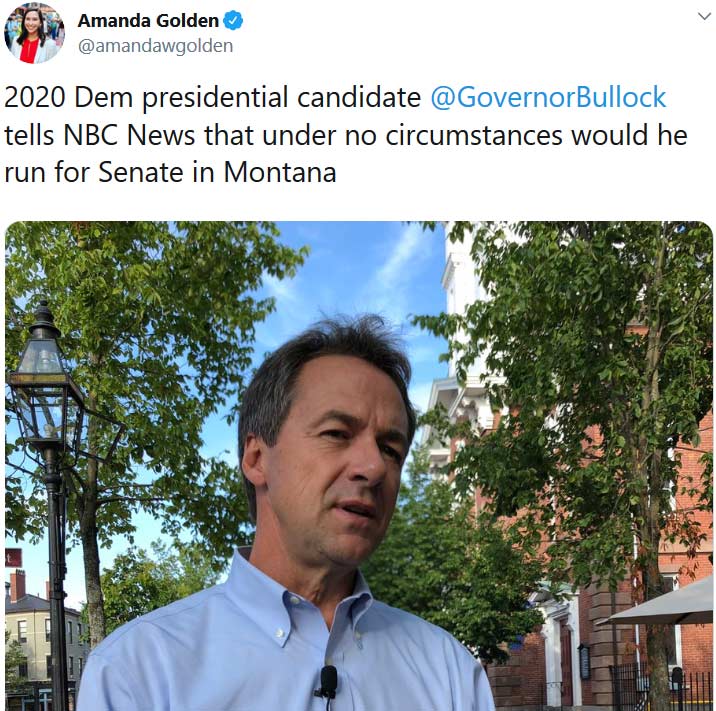
And then he had a little sit down with some guy named Barack Obama, and subsequently changed his mind. What was previously looking to be a terribly lopsided race may well prove to be one of the closest Senate races of 2020.
Polling:
| Pollster | Date Completed | Daines (R) | Bullock (D) |
|---|---|---|---|
| Emerson College | 2020/08/02 | 50% | 44% |
| Spry Strategies (R) | 2020/07/16 | 47% | 44% |
| Civiqs | 2020/07/13 | 49% | 47% |
| PPP | 2020/07/10 | 44% | 46% |
| U. of Montana | 2020/06/26 | 43% | 47% |
| Montana State U. | 2020/04/27 | 39% | 46% |
| PPP (D) | 2020/03/13 | 47% | 47% |
Previous Elections:
- 2018 Senate: Tester (D) – 50.33% / Rosendale (R) – 46.78% / Margin – D+3.55%
- 2018 House: R – 50.88% / D – 46.25% / Margin – R+4.63%
- 2016 President: Trump (R) – 56.17% / Clinton (D) – 35.75% / Margin – R+20.42%
- 2016 House: R – 56.19% / D – 40.55% / Margin – R+15.64%
Nebraska
- Incumbent: Ben Sasse (R) – Won 2014 by 32.86% – $2.96 M cash on hand Q1 2020
- Challenger: Chris Janicek (D) – $0.00 M cash on hand Q1 2020
- My Rating: R+17.2 (Hold)
There was a spate of time from the 1970s to the early 2000s that Democrats did very well in Nebraska. But these days, Nebraska is a profoundly Republican state. Both senators and all 3 House members are Republicans. That isn’t going to change in 2020. Incumbent Ben Sasse isn’t going anywhere.
Polling: None Available
Previous Elections:
- 2018 Senate: Fischer (R) – 57.69% / Gray (D) – 38.62% / Margin – R+19.07%
- 2018 House: R – 62.03% / D – 37.97% / Margin – R+24.06
- 2016 President: Trump (R) – 58.75% / Clinton (D) – 33.70% / Margin – R+25.05%
- 2016 House: R – 70.74% / D – 28.04% / Margin – R+42.70%
New Hampshire
- Incumbent: Jeanne Shaheen (D) – Won 2018 by 3.3% – $7.09 M cash on hand Q1 2020
- Challenger: (Possibly) Corky Messner (R) – $3.01 M cash on hand Q1 2020
- Challenger: (Possibly) Don Bolduc (R) – $0.10 M cash on hand Q1 2020
- Primary Date: September 8, 2020
- My Rating: D+4.1 (see writeup below for context)
In the summer of 2019, when I was putting together the first version of this guide, I wrote:
I do not envy anyone, Democrat or Republican, running for election in the state of New Hampshire. New Hampshire has been ever-so-gently drifting to the right, from a PVI of D+2 in 2008 to a PVI of EVEN in 2020. Democrats should also be concerned by the state’s SED of R+4. That’s a nasty combination. The consequences are obvious: Clinton only won by 0.37% in 2016 (while Maggie Hassan flipped this seat to Democrats by a whopping 1,017 votes). And yet, 2017 was the first year since 1979 in which both of New Hampshire’s senators were Democrats (in fact, there was a 28-year uninterrupted streak where both were Republicans).
New Hampshire can turn on a candidate in an incredibly harsh and unforgiving fashion. Republican Kelly Ayotte won in 2010 by a margin of more than 23 points. She lost her next election. That is the greatest shift in back-to-back Senate election performance going back at least a decade, which is a performance metric that is of serious concern in Maine.
All of that is irrelevant.
When I wrote the above, I expected New Hampshire to attract top-tier talent from the Republican Party, as it struck me as perhaps the most competitive Democratic-held Senate seat up for grabs in 2020, save for Michigan. However, for several months, Cory Lewandowski, the original campaign manager for Donald Trump’s 2016 presidential run, indicated that he was going to run for the seat. It wasn’t until the very end of 2019 that he finally announced that he would not, in fact, run. But by that time, it seems that he had sucked all of the oxygen out of the room, and a serious challenger never materialized.
I’ve not seen any indication from any reputable analysts suggesting that this race is competitive. At first glance, it appears that Corky Messner, the only Republican taking a stab at this race, has amassed a sizeable war chest of more than $3 million as of April 2020. However, a closer look reveals that of the $3.58 million which flowed into his campaign during the first quarter of 2020, $3.27 million was loaned to the campaign by Messner himself. He’s a self-funded vanity candidate.
There is another Republican candidate, Don Bolduc, a retired U.S. Army general. However, as of April 2020, his campaign has only $102,012.44 on hand, and thus it seems likely that his campaign will succumb to Messner’s almost certainly ill-fated stab at the seat.
What a massive miss for Republicans in what could be a competitive seat.
Polling:
| Pollster | Date Completed | Shaheen (D) | Opponent (R) |
|---|---|---|---|
| U of NH | 2020/07/28 | 54% | 35% (Corky Messner) |
| U of NH | 2020/07/28 | 54% | 35% (Don Bolduc) |
| U of NH | 2020/02/25 | 52% | 28% (Corky Messner) |
| U of NH | 2020/02/25 | 49% | 30% (Don Bolduc) |
Previous Elections:
- 2018 House: D – 54.53% / R – 43.62% / Margin – D+10.91%
- 2016 President: Clinton (D) – 47.62% / Trump (R) – 47.25% / Margin – D+0.37%
- 2016 Senate: Hassan (D) – 47.99% / Kennedy (R) – 47.84% / Margin – D+0.15%
- 2016 House: D – 46.96% / R – 44.11% / Margin – D+2.85%
New Jersey
- Incumbent: Cory Booker (D) – Won 2014 by 13.5% – $3.45 M cash on hand June 2020
- Challenger: Rik Mehta (R) – $0.02 M cash on hand June 2020
- Primary Date: July 7, 2020
- My Rating: D+19.2 (Hold)
There really isn’t a whole lot to be said about this election. Here’s why. Back in 2013, it became public knowledge that New Jersey senator Bob Menendez was being investigated by the feds on charges of corruption—bribery, fraud, making false statements, you know, the usual for mischievous politicians who want to help their wealthy friends. Two months after his trial began in September 2017, a mistrial was declared. On January 31, 2018, the Justice Department announced it was dropping the investigation.
Despite the significant stain on his reputation that Menendez incurred, he went on to win reelection to the Senate by a margin of nearly 12 points.
Former presidential candidate Cory Booker is the current incumbent of the seat up for election in 2020. In early 2020, he only had about $50,000 in the bank for his Senate campaign, as he had clearly been focused on his failed presidential bid. By mid-2020, he’d managed to up this figure to about three and a half million dollars.
But as ill-prepared as Booker was in early 2020, none of the Republican primary competitors had more than $200,000 during primary season. Months ago, when I was first writing this guide, Rik Mehta, the eventual Republican nominee, only had $181,000 in cash on hand (and that was because he loaned his campaign more than $300,000). As of June, Mehta has about $17,700 in the bank to play with (along with $330,000 in debt).
Booker could hide out in a COVID bunker between now and November and be assured of a double-digit victory margin.
Polling:
| Pollster | Date Completed | Booker (D) | Mehta (R) |
|---|---|---|---|
| Monmouth | 2020/04/19 | 55% | 32% |
Previous Elections:
- 2018 Senate: Menendez (D) – 54.01% / Hugin (R) – 42.83% / Margin – D+11.81%
- 2018 House: D – 59.92% / R – 38.63% / Margin – D+21.29%
- 2016 President: Clinton (D) – 55.45% / Trump (R) – 41.35% / Margin – D+14.10%
- 2016 House: D – 54.16% / R – 45.84% / Margin – D+8.32%
New Mexico
- Incumbent: None (D) – Incumbent Tom Udall retiring, won 2014 by 11.1%
- Challenger: Ben Ray Luján (D) – $2.45 M cash on hand Q1 2020
- Challenger: Mark Ronchetti (R) – $0.56 M cash on hand Q1 2020
- My Rating: D+20.9 (Hold)
New Mexico might normally be considered a little wibbly with a PVI of D+3 (as is the case with New Hampshire), but it’s gone quite blue in the current political climate. The Democratic incumbent in the Senate won reelection by nearly 24 points in 2018, while Democrats held D+7 and D+8 House seats by 23 and 32 point margins respectively, and flipped the remaining R+6 district by 2 points. While incumbent Mark Udall isn’t running for reelection in 2020, there’s no sign of an about face in the state’s current political leanings.
When 5-time NM-03 representative Ben Ray Luján announced his candidacy, everyone else quickly got out of the way, and his fundraising success (and the relative lack thereof for any Republican challengers) makes it clear that this seat will be an easy hold in a state that’s rapidly shifting leftward, despite claims to the contrary.
Polling:
| Pollster | Date Completed | Luján (D) | Ronchetti (R) |
|---|---|---|---|
| PPP | 2020/06/13 | 48% | 34% |
Previous Elections:
- 2018 Senate: Heinrich (D) – 54.09% / Rich (R) – 30.53% / Margin – D+23.56%
- 2018 House: D – 58.25% / R – 38.20% / Margin – D+20.05%
- 2016 President: Clinton (D) – 48.26% / Trump (R) – 40.04% / Margin – D+8.22%
- 2016 House: D – 56.01% / R – 43.99% / Margin – D+12.02%
North Carolina
- Incumbent: Thom Tillis (R) – Won 2014 by 17.7% – $6.48 M cash on hand Q1 2020
- Challenger: Cal Cunningham (D) – $3.00 M cash on hand Q1 2020
- Primary Date: March 3, 2020
- My Rating: D+6.9 (Flip R -> D)
Ah yes, North Carolina. The state where Democrats seem to have given up all hope, despite the fact that the last 3 presidential elections there have been decided by less than 4 points, and only one Senate race has been won by more than 10 points since 1974. Democrats seriously, seriously underestimate their odds of winning this race. Democratic incumbent Kay Hagin lost her seat in 2014 by only 1.5% to Thom Tillis, despite a national bias towards Republicans of nearly 6 points.
If Democrats can bear to avoid tripping over their own feet in this race, they can win this seat. While Cal Cunningham has been seen as something of a questionable pick, given that his only political experience was a 2-year term as state senator from 2001 to 2003, and he’s not exactly the most exciting of nominees. However, his military career and overall white breadedness is perhaps a valuable attribute in a state like North Carolina. He handily won the Democratic nomination over Erica Smith, a progressive candidate who was seen as such a liability that Republican PACs spent millions on pro-Smith ads.
Cunningham is not an exciting pick, but nor is he a controversial one. It should also be noted that the state’s electorate has been royally pissed off by allegations that Richard Burr, Tillis’ fellow Republican North Carolina senator, engaged in insider trading in early 2020 using information gleaned from classified briefings on COVID-19 in January and February, while party leaders were still adamant that the disease was a nonissue.
This has made the already vulnerable Tillis even more so. This race will likely be quite close. But given that Joe Biden has frequently been leading Donald Trump in presidential polling in the state, it seems likely that Cunningham has the advantage in the Senate race.
Polling:
| Pollster | Date Completed | Tillis (R) | Cunningham (D) |
|---|---|---|---|
| PPP | 2020/06/03 | 41% | 43% |
| Harper Polling (R) | 2020/05/09 | 38% | 36% |
| Neighborhood R. | 2020/05/21 | 33% | 35% |
| Meeting Street | 2020/05/13 | 44% | 46% |
| East Carolina University | 2020/05/09 | 41% | 40% |
| Civiqs | 2020/05/04 | 41% | 50% |
| Meredith | 2020/04/28 | 34% | 44% |
| SurveyUSA | 2020/04/26 | 39% | 41% |
| PPP | 2020/04/15 | 40% | 47% |
| Harper Polling (R) | 2020/04/07 | 38% | 34% |
| East Carolina University | 2020/02/28 | 44% | 42% |
| NBC News/Marist | 2020/02/27 | 43% | 48% |
| PPP | 2020/02/26 | 41% | 46% |
| Public Opinion (R) | 2020/01/15 | 48% | 44% |
| ALG Research | 2020/01/13 | 42% | 44% |
Previous Elections:
- 2018 House: R – 50.39% / D – 48.35% / Margin – R+2.04%
- 2016 President: Trump (R) – 49.83% / Clinton (D) – 46.17% / Margin – R+3.66%
- 2016 Senate: Burr (R) – 51.06% / Ross (D) – 45.37% / Margin – R+5.69%
- 2016 House: R – 53.22% / D – 46.60% / Margin – R+6.62%
Oklahoma
- Incumbent: Jim Inhofe (R) – Won 2014 by 39.5% – $2.12 M cash on hand Q1 2020
- Challenger: Abby Broyles (D) – $0.16 M cash on hand Q1 2020
- Primary Date: June 30, 2020
- My Rating: R+30.7 (Hold)
Guys, it’s Oklahoma. The state might as well cancel the general election and save a bunch of money. Incumbent Jim Inhofe isn’t going anywhere. Back in 2018, there was talk of Scott Pruitt using his post at the EPA (oh, the irony) as a launching pad for running for a Senate seat in Oklahoma. But then he ended up being the subject of at least a dozen federal investigations for misdoings ranging from misuse of taxpayer funds to abuse of power, and he was finally compelled to resign. He’s now working as a lobbyist for a coal company.
Long story short, Inhofe will have a seat in the Senate waiting for him in January 2021.
Polling:
| Pollster | Date Completed | Inhofe (R) | Broyles (D) |
|---|---|---|---|
| Amber Integrated | 2020/03/08 | 57% | 31% |
Previous Elections:
- 2018 House: R – 61.97% / D – 36.35% / Margin – R+25.62%
- 2016 President: Trump (R) – 65.32% / Clinton (D) – 28.93% / Margin – R+36.39%
- 2016 Senate: Lankford (R) – 67.74% / Workman (D) – 24.58% / Margin – R+43.16%
- 2016 House: R – 68.98% / D – 26.93% / Margin – R+42.05%
Oregon
- Incumbent: Jeff Merkley (D) – Won 2014 by 18.9% – $3.51 M cash on hand Q1 2020
- Challenger: Jo Rae Perkins (R) – $0.00 M cash on hand Q1 2020
- My Rating: D+25.8 (Hold)
At the presidential election level, Oregon has been a very consistent blue state. The last Republican presidential candidate to win in Oregon was Reagan in 1984. (For comparison’s sake, George H.W. Bush managed to win in California, Oregon’s southern neighbor, in 1988.)
But with regard to senators, Oregon has been more moderate, if still left-leaning in recent years. As recently as 1995, both seats were held by Republicans. The last Republican to hold a Senate seat in the state was Gordon Smith, who lost reelection in 2008 by a little over 3 points to… Jeff Merkley.
Merkley may have skated by in 2008, but he won by nearly 20 points in 2014. Meanwhile, Merkley’s fellow Oregon senator Ron Wyden hasn’t won reelection by less than a hair under 18% in his last 4 elections.
The extent of Merkley’s advantage is evident in the fact that the state’s Republican Party has only managed to attract garbage-tier candidates. The winner of Oregon’s May 19th primary was Jo Rae Perkins, who lost the Republican Senate primary in 2014, the U.S. House Oregon District 4 Republican primary in both 2016 and 2018. Perkin’s Senate campaign currently has the princely (princessly?) sum of $1,184.64 on hand. Oh, and Perkins is into QAnon.
Unless Merkley gets hit by a cement truck before election day, he’ll be a lock.
Polling: None Available
Previous Elections:
- 2018 House: D – 57.45% / R – 38.02% / Margin – D+19.43%
- 2016 President: Clinton (D) – 50.07% / Trump (R) – 39.09% / Margin – D+10.98%
- 2016 Senate: Wyden (D) – 56.60% / Callahan (R) – 33.35% / Margin – D+23.25%
- 2016 House: D – 53.71% / R – 38.23% / Margin – D+15.48%
Rhode Island
- Incumbent: Jack Reed (D) – Won 2014 by 41.3% – $3.10 M cash on hand Q1 2020
- Challenger: Allen Waters (R) – $0.00M cash on hand Q1 2020
- Primary Date: September 15, 2020
- My Rating: D+37.7 (Hold)
In the last 80 years or so, Rhode Island has only experimented with a very select flavor of Republicanism, specifically that practiced by the Chafee family. John Chafee was elected as one of Rhode Island’s two Senators in 1976, and was the first Republican to win a Senate race in the state in 46 years. He was reelected 3 times, and died in office, only for his son Lincoln Chafee to take over the seat and win by a healthy margin in 2000. He lost in 2008 to Sheldon Whitehouse, and since then Democrats have won the state by ridiculous margins.
Incumbent Jack Reed appears to be safe, given that none of his likely opponents is the descendant of John and Lincoln. In fact, he will likely win his race by a larger margin than any other Democrat on election night 2020, and possibly by a larger margin than any winning Senate candidate (though Reed’s opponent may be lucky enough to lose by only the second-largest margin of the night, with that title going to whatever unfortunate Democrat chooses to run in Wyoming).
Polling: None Available
Previous Elections:
- 2018 Senate: Wyden (D) – 61.45% / Callahan (R) – 38.33% / Margin – D+23.12%
- 2018 House: D – 64.98% / R – 34.78% / Margin – D+30.20%
- 2016 President: Clinton (D) – 54.41% / Trump (R) – 38.90% / Margin – D+15.51%
- 2016 House: D – 61.10% / R – 32.75% / Margin – D+28.35%
South Carolina
- Incumbent: Lindsey Graham (R) – Won 2014 by 15.5% – $12.85 M cash on hand Q1 2020
- Challenger: Jaime Harrison (D) – $8.04 M cash on hand Q1 2020
- Primary Date: June 9, 2020
- My Rating: R+14.3 (Hold)
South Carolina may be a tempting target for Democrats, in part because the historical election margins in the state are not terribly onerous, but much more so because incumbent Lindsey Graham has drifted from the role of thoughtful moderate, turning into something of a Trumpian firebrand. But while Democrats may manage to scrounge up interesting candidates, there really isn’t much hope of victory for them in South Carolina.
A Democrat hasn’t won a Senate election in the state this century. In fact, the last time that a Republican’s margin of victory was less than 10 points was in 2004, when Jim DeMint squared off against Inez Tenenbaum, then the state’s Superintendent of Education.
South Carolina isn’t anywhere close to feasible for Dems, unless something goes profoundly wrong for Republicans in the next year. But Jaime Harrison, the former chairman of the South Carolina Democratic Party, seems best positioned (given his wealth of endorsements) to capitalize on a mistake by Graham, Trump, or the GOP as a whole.
Polling:
| Pollster | Date Completed | Graham (R) | Harrison (D) |
|---|---|---|---|
| Civiqs | 2020/05/26 | 42% | 42% |
| Brilliant Corners (D) | 2020/03/11 | 47% | 43% |
| NBC/Marist | 2020/02/21 | 54% | 37% |
| East Carolina University | 2020/02/02 | 51% | 38% |
| Change Research | 2019/12/11 | 47% | 45% |
| Benchmark Research (R) | 2019/10/21 | 53% | 30% |
| Change Research | 2019/09/21 | 50% | 43% |
| Change Research | 2019/06/14 | 52% | 35% |
| Change Research | 2019/06/14 | 52% | 35% |
| WPA Intelligence (R) | 2019/03/13 | 55% | 32% |
Previous Elections:
- 2018 House: R – 54.26% / D – 44.37% / Margin – R+9.89%
- 2016 President: Trump (R) – 54.94% / Clinton (D) – 40.67% / Margin – R+14.27%
- 2016 Senate: Scott (R) – 60.57% / Dixon (D) – 36.93% / Margin – R+23.64%
- 2016 House: R – 60.53% / D – 39.47% / Margin – R+21.06%
South Dakota
- Incumbent: Mike Rounds (R) – Won 2014 by 20.9% – $1.89 M cash on hand Q1 2020
- Challenger: Dan Ahlers (D) – $0.04 M cash on hand Q1 2020
- My Rating: R+23.9 (Hold)
South Dakota is an interesting state in that it’s never been a stronghold for either party. It blows back and forth in the wind. As recently as 2015, Democrat Tim Johnson held one of the state’s two Senate seats. And in 2018, former Republican House representative Kristi Noem won the state’s gubernatorial election by a mere 3.4% over Democratic opponent Billie Sutton.
The day may come against where a South Dakota Senate seat is held by a Democrat. But that day will not come in 2020. Incumbent Mike Rounds has nothing to worry about.
Polling: None Available
Previous Elections:
- 2018 House: R – 60.35% / D – 36.01% / Margin – R+24.34%
- 2016 President: Trump (R) – 61.53% / Clinton (D) – 31.74% / Margin – R+29.79%
- 2016 Senate: Thune (R) – 71.83% / Williams (D) – 28.17% / Margin – R+43.66%
- 2016 House: R – 64.10% / D – 35.90% / Margin – R+28.20%
Tennessee
- Incumbent: None (R) – Incumbent Lamar Alexander retiring, won in 2014 by 30.0%
- Challenger: Bill Hagerty (R) – $5.65 M cash on hand Q1 2020
- Challenger: (Likely) James Mackler (D) – $0.53 M cash on hand Q1 2020
- Primary Date: August 6, 2020
- My Rating: R+27.1 (Hold)
Tennessee was a state that desperate Democrats turned to for hope in the waning weeks of the 2018 election season. Incumbent Bob Corker had retired, and Democrats managed to recruit a decent candidate, Phil Bredesen, who had been governor of the state from 2003 to 2011. This flicker of hope was encouraged by a surprising endorsement of Bredesen by singer Taylor Swift, which set off a record-setting spike in new voter registrations in Tennessee.
Alas, it wasn’t enough. Republican candidate Marsha Blackburn won by a margin of nearly 11 points.
Tennessee is going to have back-to-back open elections, as 3-time incumbent Lamar Alexander announced that he would not run again in 2020. But while the margin will probably be closer than suggested by my projection of R+27.1—it’s been skewed due to being based upon the victory margins of two strong incumbents—Democrats likely have even less of a chance in 2020 than they did in 2018.
Polling:
| Pollster | Date Completed | Hagerty (R) | Opponent (D) |
|---|---|---|---|
| Mason-Dixon | 2020/01/30 | 55% | 33% (James Mackler) |
Previous Elections:
- 2018 Senate: Blackburn (R) – 54.71% / Williams (D) – 43.92% / Margin – R+10.79%
- 2018 House: R – 59.25% / D – 39.19% / Margin – R+20.06%
- 2016 President: Trump (R) – 60.72% / Clinton (D) – 34.72% / Margin – R+26.00%
- 2016 House: R – 62.47% / D – 34.05% / Margin – R+28.42%
Texas
- Incumbent: John Cornyn (R) – Won 2014 by 27.2% – $12.89 M cash on hand Q1 2020
- Challenger: (Likely) MJ Hegar (D) – $1.10 M cash on hand Q1 2020
- Challenger: (Possibly) Royce West (D) – $0.12 M cash on hand Q1 2020
- Primary Runoff Date: July 14, 2020
- My Rating: R+9.1 (Hold)
History tells us that Texas could surprise us big time. In 2018, Beto O’Rourke spooked Texas Republicans by coming within 2.56% of defeating incumbent and recent presidential candidate Ted Cruz. This was the best performance by a Democratic Senate candidate in Texas since Lloyd Bensen (D) won reelection by more than 19 points in 1988. (Yes, that’s how bad things got for Democrats in Texas—since Bensen’s victory, a Democrat hadn’t even managed to lose by single digits until O’Rourke came along.)
And there are signs that Republicans in the state are even paranoid and freaked out than they were in 2018. As of September 4th, 2019, 5 of the state’s Republican U.S. representatives have already announced they aren’t running again in 2020. Meanwhile, the Texas House of Representatives is embroiled in a massive controversy where the House Speaker was reportedly recorded asking for help in defeating other Republican members in their 2020 reelection efforts.
Given all of the above, and the desperate desire of Democrats to see the ancient prophecies of Texas going blue brought to fulfillment, stupid, stupid amounts of money are going to be spent on this race, even though states like North Carolina and Georgia offer Democrats better shots at victory. My projected margin forecasts a reasonably solid win for incumbent John Cornyn. But this Republican advantage could be overstated due to a strong incumbent effect in the state. Perhaps my projection is failing to keep up with a state in a, erm, state of rapid change, as is the case with West Virginia.
Could Texas hold a surprise in store for us in 2020? I think that ultimately depends on the strength of the Democratic nominee, and where they fall politically. O’Rourke fell just a little short in 2018. Perhaps another candidate will do better at activating traditionally conservative segments of the Texas electorate that were never thrilled about Donald Trump‘s rise in the Republican Party, and are growing increasingly disenchanted with the political direction of the GOP. And an even more dismayed electoral segment, conservative and moderate women, may prove to be a particularly critical audience to persuade in 2020.
Polling:
| Pollster | Date Completed | Cornyn (R) | Opponent (D) |
|---|---|---|---|
| UTT | 2020/04/27 | 37% | 24% (Hegar) |
| UTT | 2020/04/27 | 35% | 20% (Hegar) |
| NBC News/Marist | 2020/02/27 | 49% | 41% (Hegar) |
| Beacon (R) | 2019/11/21 | 45% | 30% (Hegar) |
| Beacon (R) | 2019/11/21 | 45% | 33% (West) |
Previous Elections:
- 2018 Senate: Cruz (R) – 50.89% / O’Rourke (D) – 48.33% / Margin – R+2.56%
- 2018 House: R – 50.41% / D – 46.97% / Margin – R+3.44%
- 2016 President: Trump (R) – 52.23% / Clinton (D) – 43.24% / Margin – R+8.99%
- 2016 House: R – 57.19% / D – 37.06% / Margin – R+20.13%
Virginia
- Incumbent: Mark Warner (D) – Won 2014 by 0.8% – $8.70 M cash on hand June 2020
- Challenger: Daniel Gade (R) – $0.11 M cash on hand June 2020
- Primary Date: June 9, 2020
- My Rating: D+19.9 (Hold)
It’s very understandable if you look at those 2016 numbers for Virginia and think, “Okay, Democrats did well there in 2018, but how do we know that 2020 won’t look more like 2016?”
But you have to remember that as a whole, 2016 slightly favored the Republican Party as a whole (not just at the presidential level). At the congressional election level, Republicans won the vote by 1.1%. Two years later, the country had moved 9 and a half points to the left, decimating Republican representation in the House.
But keen-eyed politicos recognized that something was up long before election day of 2018. In fact, one of the strongest hints that a so-called “blue wave” was coming was the Virginia state elections a year prior.
Virginia is one of those odd states that has its state government elections in odd years. In the run-up to the election on November 7, 2017, Democrats were modest favorites. Polling in the last days before the gubernatorial election between Democrat Ralph Northam and Republican Ed Gillespie ranged between Northam winning by 6, and Gillespie winning by 3. RealClearPolitics’ final polling average was Northam winning by 3.3%.
Meanwhile, all 100 seats in the Virginia House of Delegates were up for grabs. In 2015, Republicans had lost one seat, but still controlled it with a 66-34 majority. Democrats hadn’t controlled it since 2000. It was expected that Democrats would pick up anywhere from 2 to half a dozen or so seats, but not nearly enough to keep things close.
Northam didn’t win by 3.3%. He won by nearly 9%. And Democrats didn’t flip a couple seats in the House of Delegates. They flipped 15, leaving Republicans with the slightest possible majority of 51 seats—and they only managed that because in one seat where the election had ended in a tie (11,608 votes for the Dem, 11,608 for the Republican), the Republican candidate won a lot draw.
Virginia is not a very liberal state. It’s very purple. The results of the 2017 Virginia election woke a lot of people up to the fact that a groundswell of support for Democrats was likely developing nationwide.
All the evidence we have says that conditions in Virginia in 2020 will much more closely resemble 2017 (and 2018 when Tim Kaine easily held his seat and Dems went from holding 4 of the state’s 11 U.S. House seats to holding 7) than 2016. But we’ll soon be able to test this hypothesis. The state’s odd-year election is rolling around again. On November 5th, the state’s residents will cast their votes for the Virginia Senate and House of Delegates.
I expect the Democrats to do very well in Virginia in November 2019. And provided that’s the case, the same will be true in November of 2020.
And that will be a relief to Senator Mark Warner, the Democratic incumbent up for reelection in 2020. While he practically sidled into his Virginia Senate seat with a 31+ point win in 2008, he just barely skated by with a 0.8% win in 2014 over Republican Ed Gillespie (yes, the same guy who lost the gubernatorial election 3 years later). Warner’s 2020 race will almost certainly look much more like his freshman race than his sophomore one.
Polling: None Available
Previous Elections:
- 2018 Senate: Kaine (D) – 57.00% / Stewart (R) – 44.01% / Margin – D+12.99%
- 2018 House: D – 56.36% / R – 42.52% / Margin – D+13.84%
- 2016 President: Clinton (D) – 49.73% / Trump (R) – 44.41% / Margin – D+5.32%
- 2016 House: D – 49.17% / R – 48.74% / Margin – D+0.43%
West Virginia
- Incumbent: Shelley Moore Capito (R) – Won 2014 by 27.7% – $3.03 M cash on hand Q1 2020
- Challenger: Paula Jean Swearingen (D) – $0.07 M cash on hand Q1 2020
- My Rating: D+2.0 (Flip R -> D) (Please ignore, see below)
You’re probably wondering what the hell is going on with West Virginia and that D+2.0 rating. Basically, I think the state is so weird with its historically Democratic populace that has gone super-red at an almost hilarious rate that it simply breaks my methodology. All the historical data we have has been compromised by the political revolution the state has undergone. Joe Manchin won a second full term in 2018 by more than 3 points. But once the state disposes of its last few Democratic incumbents that it keeps around for old time’s sake, it will have completed its transformation into the Wyoming of the East.
Capito will win reelection, and will do so by double digits. Chalk this one up as a preemptive miss for my approach.
Polling: None Available
Previous Elections:
- 2018 Senate: Manchin (D) – 49.57% / Morissey (R) – 46.26% / Margin – D+3.31%
- 2018 House: R – 58.33% / D – 40.58% / Margin – R+17.75%
- 2016 President: Trump (R) – 68.50% / Clinton (D) – 26.43% / Margin – R+42.07%
- 2016 House: R – 64.84% / D – 32.70% / Margin – R+32.14%
Wyoming
- Incumbent: None (R) – Incumbent Mike Enzi retiring, won in 2014 by 54.7%
- Challenger: (Likely) Cynthia Lummis (R) – $1.04 M cash on hand Q1 2020
- Challenger: (Possibly) Merav Ben-David (D) – $0.01 M cash on hand Q1 2020
- Challenger: (Possibly) Yana Ludwig (D) – $0.01 M cash on hand Q1 2020
- Primary Date: August 18, 2020
- My Rating: R+48.2 (Hold)
Incumbent Mike Enzi, who has held his Senate seat for 4 terms, has announced that he will not run again in 2020. If Democrats can manage to find the right candidate—ahahahahahhahahahaha. No. Seriously. It’s Wyoming. The Republican primary is effectively the general election for this seat.
There had been a lot of talk about Liz Cheney—daughter of Dick Cheney and sole representative of Wyoming in the U.S. House—running for the seat. And while she was clearly tempted, she clearly has long-term plans that require her continuing to hold the House seat her dad held from 1979 to 1989. Those plans likely come in the form of being Speaker of the House one day. Or even higher aspirations. Thus, it is almost certain that the future senator from Wyoming will be Cynthia Lummis, Cheney’s predecessor in Wyoming’s lone House seat.
Polling: None Available
Previous Elections:
- 2018 Senate: Barrasso (R) – 66.96% / O’Rourke (D) – 30.10% / Margin – R+36.86%
- 2018 House: R – 63.58% / D – 29.77% / Margin – R+33.81%
- 2016 President: Trump (R) – 67.40% / Clinton (D) – 21.63% / Margin – R+45.77%
- 2016 House: R – 62.03% / D – 29.97% / Margin – R+32.06%

